|
April 13, 2019 - No. 13
Matters of Concern
to the Polity

Alberta Election 2019
• Working
People Are Fighting for a Pro-Social Direction for Alberta
• Stop Paying
the Rich and Increase Funding for Social Programs
Education Is a Right!
• Alberta
Teachers and Students Demand Working and Learning Conditions that
Guarantee Education as a Right for All
- Kevan Hunter -
• United
Conservative Party Uses Straw Men to Attack
Alberta's Curriculum
Reform
- Dougal MacDonald -
• Class Size
Matters
Defending Public Health and Seniors'
Care
• Health Care
Unions Speak Out
• Medical Lab
Workers Say No! to Scrapping New Public Facilities
• Alberta
Seniors Deserve Better Campaign
Protecting Water -- An Election
Issue
• Residents
Organize to Protect the Clearwater
River
Opposition to Anti-Social Offensive
Continues in Ontario
• Mass
Actions Militantly Reject Ford Government's
Attacks on
Education
Hands Off Venezuela!
• Illegal
Manouevres and Impotent Demands to
Support Regime Change Rebuffed
• Selling or
Saving the Soul of the OAS
- Sir Ronald Sanders, Ambassador
of
Antigua and Barbuda
to the OAS -
• Intervention
of
Venezuelan
Ambassador
Samuel
Moncada
Before the United Nations Security Council
The Brexit Fiasco
• Solutions
Require the People Speaking in Their Own Name
Palestinian People Will Not Back
Down
• Great
March
of Return Protests Continue as Israel Targets Youth
Supplement
Important Anniversaries
• 80th
Anniversary of the End of the Spanish Civil War
• 100 Anniversary of
Jallianwalla Massacre in Punjab
Alberta Election 2019
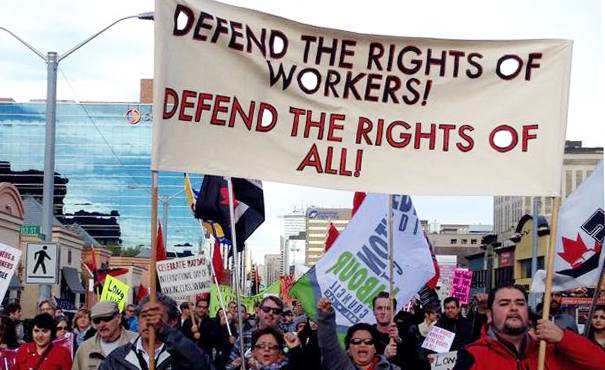
Alberta has a population of 4.3 million, a million
people are next door in Saskatchewan and another million in Manitoba,
all
interconnected with the Prairie. A natural region perhaps, which
could even include the north.
 Just imagine the human and
natural resources this region
possesses: vast agriculture, oil, natural gas, coking coal for
steel, uranium, timber, diamonds, potash, wind and sun galore
and who knows what else replete with an educated working class.
Why the recurring crises? Who or what is blocking the development
of the New and why? The possibilities are endless for the region
to develop an independent diverse economy with resource
extraction, manufacturing, social programs, public services and
modern infrastructure, an economy that has as its motive to
guarantee the well-being and security of the people and the
humanization of the social and natural environment. Just imagine the human and
natural resources this region
possesses: vast agriculture, oil, natural gas, coking coal for
steel, uranium, timber, diamonds, potash, wind and sun galore
and who knows what else replete with an educated working class.
Why the recurring crises? Who or what is blocking the development
of the New and why? The possibilities are endless for the region
to develop an independent diverse economy with resource
extraction, manufacturing, social programs, public services and
modern infrastructure, an economy that has as its motive to
guarantee the well-being and security of the people and the
humanization of the social and natural environment.
This is not the agenda in the provincial election
scheduled to
take place on Tuesday, April 16. On the contrary, the agenda has been
set by the ruling elite and the people are supposed to take sides
for one version or another of an agenda which they do not set and
which does not represent their interests and claims on society.
For instance, the ruling elite in Alberta persist in privatizing health
care despite the broad opposition of the
people. They refuse to increase public investments in health
care, which would resolve persistent problems of wait times in
acute care and the lack of a modern and humane seniors' care
system with adequate staffing.
Health care and other public sector workers continue to
face wage freezes, growing workloads and the refusal of the ruling
elite to recognize that their working conditions are the living
conditions of patients and seniors in their care.
The working people have long laid their claim to health
care
as a right. Despite massive disinformation campaigns over
balancing budgets, pushing private control and ownership of
health care, the expansion of two-tier medicine, and putting all
economic eggs in the same old resource extraction sector, the
ruling circles have failed to blunt the working people's demand
for a pro-social alternative. The people of Alberta have always
met the anti-social campaigns with resistance. They are facing
the problem of how to empower themselves politically to build the New
in a
decisive way with no turning back.
 The long-standing demand of
the working people is that those
in government must take up their social responsibility to
organize the productive forces to guarantee the right of all to
the highest quality health care and seniors' care, as well as
education and other aspects of public services which affect their
lives. Albertans reject policy objectives and electoral platforms
full of platitudes from the cartel parties, or the obscurantism
of balancing a budget through austerity where those in power
control what is being balanced or not balanced and who
benefits. The long-standing demand of
the working people is that those
in government must take up their social responsibility to
organize the productive forces to guarantee the right of all to
the highest quality health care and seniors' care, as well as
education and other aspects of public services which affect their
lives. Albertans reject policy objectives and electoral platforms
full of platitudes from the cartel parties, or the obscurantism
of balancing a budget through austerity where those in power
control what is being balanced or not balanced and who
benefits.
Albertans do not let up on their demand for concrete
results,
beginning with increased investments in social programs in the
here and now. More broadly, they require a new direction for the
economy away from reliance on natural resources controlled by
outside forces not interested in building a modern all-sided
Albertan economy based on manufacturing, resource extraction,
agriculture, public services and social programs to meet the
needs of all and guarantee their rights and well-being.
Albertans demand accountability from governments as to
what is
being done to restrict and eliminate private control and
ownership of social programs where enterprise and interest profit
sap the lifeblood of the health and education sectors. The aim of
private ownership and control is not the well-being of the people
but enriching wealthy private interests and taking value out of
the economy to be used elsewhere. Value produced in Alberta must
remain in the economy and be invested in ways that build its
self-reliance in opposition to the destructive grip of the global
oligarchs, in particular the oil barons.
A Pro-Social Alternative Is Right Before Our Eyes
 The cartel parties vying
for power in the Alberta election all represent to one degree or
another the neo-liberal line that the right to health care cannot be
guaranteed because of a "lack of money." The budget plans of the New
Democratic Party (NDP) and the United Conservative Party (UCP) both
reject increased investments in social programs and public services.
Instead they call for cuts to spending on social programs and public
services with only the degree marking any difference. The working
people are told that the only choice is to accept "compassionate
austerity" or be faced later with massive cuts, two-tier medicine, and
more privatization to serve the rich. The cartel parties vying
for power in the Alberta election all represent to one degree or
another the neo-liberal line that the right to health care cannot be
guaranteed because of a "lack of money." The budget plans of the New
Democratic Party (NDP) and the United Conservative Party (UCP) both
reject increased investments in social programs and public services.
Instead they call for cuts to spending on social programs and public
services with only the degree marking any difference. The working
people are told that the only choice is to accept "compassionate
austerity" or be faced later with massive cuts, two-tier medicine, and
more privatization to serve the rich.
The alternative of mobilizing the modern productive
forces in
a pro-social direction is staring us in the face. It can be seen in the
fight of
health care workers and professionals and teachers and education
workers who know what is needed to guarantee health care and
education as a right. They raise the real issues they and the
people face which puts the lie to the neo-liberal jargon of
experts who make a mystery of everything. One example is the
refrain of "throwing more money at it does not guarantee a
solution." Of course, when money is thrown at something not to
solve problems but to line the pockets of private interests this
guarantees failure.
In this issue of TML Weekly, several articles
testify
to the people's struggles in defence of the rights of all which
will be pursued irrespective of who wins the Alberta
election.

The electoral programs of the Alberta New Democratic
Party (NDP) and the United Conservative Party (UCP) both call for cuts
to spending on social programs and public services. These anti-social
programs are said to be necessary to eliminate the existing annual
deficit in the provincial budget, bring expenditures and revenue into
balance and reduce the provincial debt. This talk of balancing the
budget is all the
rage across the country with Alberta and Ontario leading the
charge. It is a farce. A person can balance or not balance
anything when the person controls what is being balanced. What
does this balancing of provincial revenue and expenditures have
to do with solving the problem of guaranteeing health care and
education as a right for all? Nothing! It is medieval
obscurantism of the worst kind, a trick to throw the working
class into confusion and have it give up fighting for its rights.
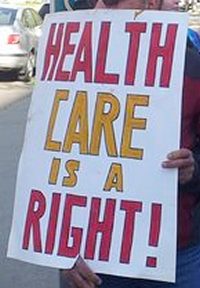 At the end of the four
years of the proposed NDP and UCP
budgets, what problem will they have solved? Certainly not the
problem of guaranteeing health care and education for all as a
right. Even their budgets remain unbalanced with the NDP deficit
only slightly greater than that of the UCP and the overall
provincial debt not much different. The UCP cuts revenue by
decreasing corporate taxation while at the same time more
severely cutting expenditures for social programs and public
services. The NDP cuts expenditures on social programs and public
services as well but with not much change in revenue. The end
result for the two cartel parties in terms of their balancing act
is a saw-off, while problems in the health care and education
sectors remain unresolved.[1] At the end of the four
years of the proposed NDP and UCP
budgets, what problem will they have solved? Certainly not the
problem of guaranteeing health care and education for all as a
right. Even their budgets remain unbalanced with the NDP deficit
only slightly greater than that of the UCP and the overall
provincial debt not much different. The UCP cuts revenue by
decreasing corporate taxation while at the same time more
severely cutting expenditures for social programs and public
services. The NDP cuts expenditures on social programs and public
services as well but with not much change in revenue. The end
result for the two cartel parties in terms of their balancing act
is a saw-off, while problems in the health care and education
sectors remain unresolved.[1]
Increased funding for social programs and public
services is a
pro-social response to solve a problem. By doing so, a program is
undertaken to bring social and public services into the
twenty-first century in conformity with the socialized productive
forces generally. This opens the door to solving the problem of
guaranteeing the right of all to education and health care.
The productive forces need healthy and educated working
people. The value educated and healthy workers bring to the
productive forces in all sectors spurs them forward to produce
greater value and raise up the entire society. Private ownership
with the motive of making enterprise and interest profit robs the
health care and education systems of much needed resources and
revenue to expand and humanize them. The problem of private
ownership taking value out of the sector and even the economy
altogether is compounded with the refusal of other sectors to
realize (pay for) the full social value they consume when buying
the capacity to work of working people.
Science and technology have made enormous advances
making it
possible for people to live longer and healthier lives. Fifty
years ago treatment for a heart attack was very crude with one in
three people dying compared with one in 20 today. Hip replacement
surgery was rare until the late 1980s, with little alternative to
pain and disability.
Increased funding for health care and education reflects
these
and many more profound changes to the quality of people's lives
and to longevity. To see this advance as a drain on society is
the most inhuman, anti-social outlook possible. To increase
funding for social programs and public services is a positive
direction for the economy.
Funding of Health Care and Education
How should health care and education be funded?
Solutions to
this problem are restricted to those available within the
neo-liberal agenda and what it considers acceptable for
discussion. Those that declare funding of social programs a
problem of a lack of general tax revenue suggest that working
people should be willing to pay higher taxes to have better
social programs, and to pay carbon taxes if they are concerned
about climate change. Another suggestion is that Alberta should
institute a sales tax, a regressive tax that hits the working
class and poor the hardest.
 Other neo-liberal solutions
are the suggestion that government
spending on social programs is too much and should be cut back.
With layoffs and cutbacks more public money can go directly into
the hands of the rich, which they say will then trickle down to
the working people when in fact all that trickles down is the
blood, sweat and tears of working people. Other neo-liberal solutions
are the suggestion that government
spending on social programs is too much and should be cut back.
With layoffs and cutbacks more public money can go directly into
the hands of the rich, which they say will then trickle down to
the working people when in fact all that trickles down is the
blood, sweat and tears of working people.
The ruling elite deem that the forms of taxation that
came
into being in the twentieth century such as income tax both
personal and corporate, property taxes and user fees for public
services are all necessary and beyond question or even
discussion. In contrast, many working people consider general
taxation to fund social programs a fraud to obscure the
refusal of company oligarchs to pay for the public value they
receive from social programs and public services.
The problem is not lack of money to invest in social
programs
and public services but the lack of realization by other sectors
of the economy of the value those programs produce and the return
of that value to those public institutions that produced it. In
the modern, interconnected economy of industrial mass production,
the different parts of the economy must realize the value they
consume from other sectors including the value from social
programs and public services. The refusal of the ruling elite in
control to recognize and realize the full value their companies
consume from social programs and public services greatly weakens
the economy.
The refusal to pay the full social value of the capacity
to
work of healthy and educated workers over their lifetime is a
glaring example. This extends to the refusal of the big companies
to pay for the value they receive from public transit, roads,
highways, bridges, airports, research carried out at public
institutions and all else that is necessary for a modern society
and its integrated economy of industrial mass production.
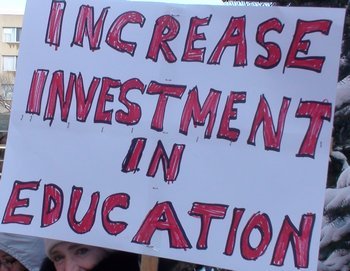 The oligopolies demand that
the state provide them with
healthy educated workers, public infrastructure and services they
require without realizing the full social value. Never mind that
many oligopolies do not even pay taxes or what they pay is far
below the posted rate because of tax breaks of various kinds.
Never mind the billions they receive in pay-the-rich schemes and
in infrastructure and services that have become normal practice
for big business. The end result is recurring economic crises and
insecurity for working people. The oligopolies demand that
the state provide them with
healthy educated workers, public infrastructure and services they
require without realizing the full social value. Never mind that
many oligopolies do not even pay taxes or what they pay is far
below the posted rate because of tax breaks of various kinds.
Never mind the billions they receive in pay-the-rich schemes and
in infrastructure and services that have become normal practice
for big business. The end result is recurring economic crises and
insecurity for working people.
The block to increasing investments in social programs
and
public services is not a problem of lack of money but of the
social, economic and political power and control the financial
oligarchy exerts over the economy to make it serve its private
interests, and the absence of social responsibility in their aim.
This is countered by the striving of the people for empowerment
so that they can control the decisions which affect their lives.
It is their struggles in defence of the rights of all which make
the difference, not the election promises or policy objectives of
the cartel parties vying to form the next government.
Note
1. "At the end of the
four-year budget period, the projected deficits are $3.2 billion
for the 2018 NDP budget plan and $1.4 billion for the UCP plan [...]
[T]he UCP's fiscal strategy is not to address the deficit or
debt, since the UCP's stated debt load after four years of $86
billion is not far off from the NDP projection of $95 billion."
-- From: The Employment Impact of Election Promises: Analysis
of budgetary scenarios of UCP and NDP platforms, prepared for
the Alberta Federation of Labour (April 2019).

Education Is
a Right!
- Kevan Hunter -

Teachers are using the Alberta election as an
opportunity to
take to a new level their ongoing battle to provide the right to
education with a guarantee. Teachers are making class size and
classroom composition issues in the election. The Alberta
Teachers' Association (ATA) has stepped up its Class Size Matters
campaign and is also providing information and materials on other
important issues in education. The ATA has produced thousands of
postcards that highlight the issue of unacceptably large
classes.
In its own words, the ATA is a "fiercely non-partisan"
organization. It does not support or oppose any political party
but intervenes politically in and out of elections to advocate
for conditions in education that will allow students to flourish
and meet their full potential. These include the practical
conditions teachers require to do their work in support of their
students.
 Teachers are going door to
door and speaking with their
neighbours about their concerns with the present conditions in
the education system. The refusal of governments to provide the
necessary investments to solve the problem of class sizes
violates the demands not only of students and teachers but of the
entire polity. Based on teachers' door-to-door experience so far, it is
clear that people are concerned about the state of
education and express a sentiment that something must be
done. Teachers are going door to
door and speaking with their
neighbours about their concerns with the present conditions in
the education system. The refusal of governments to provide the
necessary investments to solve the problem of class sizes
violates the demands not only of students and teachers but of the
entire polity. Based on teachers' door-to-door experience so far, it is
clear that people are concerned about the state of
education and express a sentiment that something must be
done.
For years, chronic underfunding of the education system
has
resulted in deteriorating conditions in schools. When asked what
problems they face in classrooms, teachers overwhelmingly state
that class sizes are the biggest cause for concern. Secondly,
they are seeing an increasing number of students with special
needs being integrated into regular classrooms without the additional
supports they require to be successful. Also of concern is the
fact that wages have been frozen for six of the last seven years,
with a raise of about 2.5 per cent (varying slightly for each
school board) in 2015. When the cost of living is considered,
this means teachers' salaries have been cut by about 7.5 per cent
since 2012.
The 2003 Alberta Commission on Learning (ACOL) report
included guidelines for classroom sizes, which suggested 17 students
for K-3. The ATA reports: "Last school year, 81 per cent of K-3
classes
were larger than the [ACOL]
guidelines and all but five school jurisdictions exceeded the
target set by ACOL. These averages also don't fairly represent
the large number of classes that are significantly larger than
the average. Since 2002, the proportion of core classes with 40
or more students has grown by 600 per cent."
Teachers' actions in this election build on the campaign
launched last year when teachers sent postcards to Members of
the Legislative Assembly informing them of conditions in
classrooms, and posted those images widely on social media as well. The
ATA also declared April 9 a candidate contact blitz day,
encouraging teachers to be in touch with candidates and ask them
how they plan to uphold the right to education by ensuring that
schools have adequate resources to meet the needs of students and
teachers.
  
Another very serious concern is the gaping hole
separating
general high school completion rates in Alberta and those of
Indigenous students. Overall, 80 per cent of students complete
high school within five years, while only 60 per cent of
Indigenous students do so.
The NDP government's policy says it funds education
according
to the increase in population. This means the per capita amount
per student remains the same. The PC government, which was
defeated in 2015, advocated no funding for population increases.
In the NDP's last government budget, the education operations and
maintenance budget was cut, and student transportation remained the
same despite the increase in student numbers, as did the
governance and system administration budget. The NDP budget
contained no funding to meet the claims of teachers who are
moving up the salary grid, and the funding for students with
identified special needs falls far below what school boards
actually allocate. The result has been a shortfall in other
areas leading to further increases in class sizes.
 For example, the Calgary
Board of Education (CBE) states that
it requires an additional $21 million in funding just to maintain
its existing level of service, even without adding more students.
The CBE also points out that government funding in all areas
falls short of what is required. It states that $136 million in
allocated funding goes to support the 21,000 students with
identified special needs, while actual government funding only
accounts for $78 million. Similarly, support targeted at the
29,000 English Language Learners in the CBE totals $31 million,
while government grants in this area total only $23.5
million. For example, the Calgary
Board of Education (CBE) states that
it requires an additional $21 million in funding just to maintain
its existing level of service, even without adding more students.
The CBE also points out that government funding in all areas
falls short of what is required. It states that $136 million in
allocated funding goes to support the 21,000 students with
identified special needs, while actual government funding only
accounts for $78 million. Similarly, support targeted at the
29,000 English Language Learners in the CBE totals $31 million,
while government grants in this area total only $23.5
million.
Teachers are discussing why this is the case. Is it true
that
the problem is "lack of money?" Such an argument does not hold
any water because education is not a cost to society. Education
is essential to the functioning of a modern society and adds
immense value. The younger generation must acquire the knowledge
and skills necessary to be active citizens. Investments in
education are realized over and over in the form of value
transferred into the economy and society. This value is embedded
within their students and transferred into the service or goods
they produce when they work.
A problem occurs with the refusal of companies to
realize (pay
for) the value they receive from social programs such as
education and the refusal of governments to force them to do so.
The refusal to realize the value of education within the economy
is responsible for the continued underfunding of education. Far
from contributing to a vibrant economy organized to meet the
needs of the people, the refusal of companies and government to
realize the value of education contributes to the deepening of
the economic crisis and collapse of the living and working
conditions of the people.
Education is a right. This principle of a modern society
forms the basis of the claims of students to have their right to
education guaranteed and the right of teachers to be accorded the
tools and conditions to fulfil this right. Students and teachers
have broad support from the working people to guarantee education
as a right for all. The people are concerned with providing a
bright future for the youth and meeting the needs of society. For
governments to deprive the people and society of this right is to
abdicate their social responsibility and render them unfit to
govern.
Teachers have not abandoned the fight taken up in 2002
to
bring their working conditions and students' learning conditions
up to a level necessary to guarantee education as a right for all
in the twenty-first century. The need is clear for teachers to
strengthen their organization and independent stand in defence of
public education and increased funding for all social programs.
The youth today together with their teachers and all education
workers are determined to build the New. They declare with one
voice that those political forces that refuse to uphold their
social responsibility towards the youth and society will be cast
aside in favour of the New.


- Dougal MacDonald -
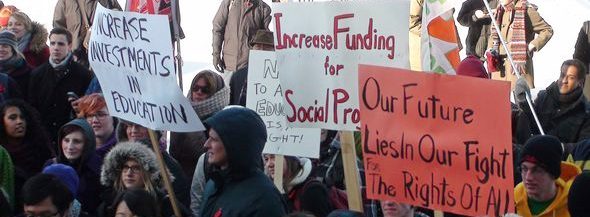
Alberta's United Conservative Party (UCP), run by former
Harper federal Minister of Immigration Jason Kenney, has released
its political platform for the Alberta provincial election. One
of the platform statements about education reads: "End the focus
on so-called 'discovery' or 'inquiry' learning, also known as
constructivism." Not surprisingly, this is complete
disinformation, not to mention verbal nonsense. The UCP
platform-makers are either being deliberately obtuse to push
their own agenda or they know very little, if anything, about
teaching and learning.
The context for the UCP's attacks on education is the
current
process of curriculum reform by the NDP government. This reform
is an urgent need; with a number of curricula now well beyond
their best-before date. The elementary science curriculum for
example is 23 years old. The elementary art curriculum is 34
years old. This is the result of 44 years of Conservative
governments that continuously starved education of funds and
directed public money as pay-the-rich schemes to the mostly
foreign-owned energy companies, which continue to dominate
Alberta.
For starters, "discovery," "inquiry," and
"constructivism" are
three
different things. Discovery and inquiry are teaching strategies.
Constructivism is a theory of learning. The reason the UCP is
referencing discovery, inquiry and constructivism in its attacks
on education is that they serve as convenient "straw men" for the
UCP claim that education in Alberta is in a terrible state
because irresponsible teachers are not doing their job properly
and that the "cure" is to turn teaching into straightforward
indoctrination, the very thing they accuse others of doing.
The term "discovery" came to the fore in the 1960s when
North
American science curricula were undergoing major changes sparked
by the launch of the Soviet Union's Sputnik satellite. This led
to the ruling elite being concerned about "being behind." As a
new focus for science education, "discovery" science emerged in
the 1960s in reaction to the dominance of behaviourism in
educational learning theory, which had conceived of students as
passive assimilators of what they were taught. The main proponent
of "discovery" was Jerome Bruner who was also known as "Dr.
Discovery."
Bruner conceived of the learner as an active
sense-making
participant instead of a passive recipient of knowledge. This was
an advance, a part of the slow transition from behaviourist to
more cognitivist views of learning. What became important was not
just what students could do but what they thought. It soon became
clear that "discovery" science paid too little attention to the
role of the teacher in introducing students to important
scientific ideas and hence was long ago discarded by most science
educators. As one science educator, Charles Anderson, put it: "Left to
their own devices students may
discover many interesting things about plants or light, but they
will develop scientific ideas about photosynthesis or vision as
rapidly as the human race. In other words, not in a single
lifetime."
"Inquiry" or "scientific inquiry," not "discovery," is
currently the
main teaching strategy in science education. It did not fall from
the sky but is based on what practicing scientists actually do to
pursue scientific investigations. Students are encouraged to act
like "little scientists" and to conduct scientific investigations
using methodologies similar to what scientists use, e.g.,
controlled experiments. Conclusions about the world of nature are
based as much as possible on student findings, which are
discussed and interpreted using arguments based on evidence and
reason, often first in a small group setting then as a whole
class.
Again, when carrying out "scientific inquiry," students
do
not
discover everything by themselves as teachers play an active
role. Teachers participate by organizing lessons, assisting
student learning, introducing students to current scientific
knowledge and so on. The guiding slogan is not just "Hands-on"
but, "Hands-on, minds-on." Currently, a strong consensus exists
among science educators and many scientists that at present there
is no better strategy than "scientific inquiry" for teaching
science to students.
"Constructivism" is a theory of learning that became
popular in
the 1980s. "Constructivism" is based on the premise that students
make sense of what they are taught in light of what they already
know. Many science educators now include a lesson stage where
they formally survey the ideas about the natural world that
students have before the teaching takes place, i.e., students'
pre-existing ideas. This is because research has shown that
students (and adults) are likely to have non-scientific ideas,
which can impede their learning of scientific ideas, again in
contrast to the behaviourist notion that the mind is a blank
slate to be written upon. An example of a pre-existing idea could
be, "Gravity in space is zero."
"Constructivism" has its weaknesses but has led to
important new
science teaching strategies that take into account students'
pre-existing ideas, which have proven to be more effective than
previous strategies in terms of students advancing their
understanding of scientific concepts. As one educator said, it
helps teachers "make the science plausible in the context of a
meaningful experience."
Teachers' implementation of "constructivism" has not
weakened
science learning but strengthened it. Of importance in this
regard is to keep in mind that ideas about teaching and learning
are always works in progress. They are tested in practice and
upon implementation can be revised and/or discarded based on the
evidence gathered from trying them out with students in the
classroom.

For Your
Information
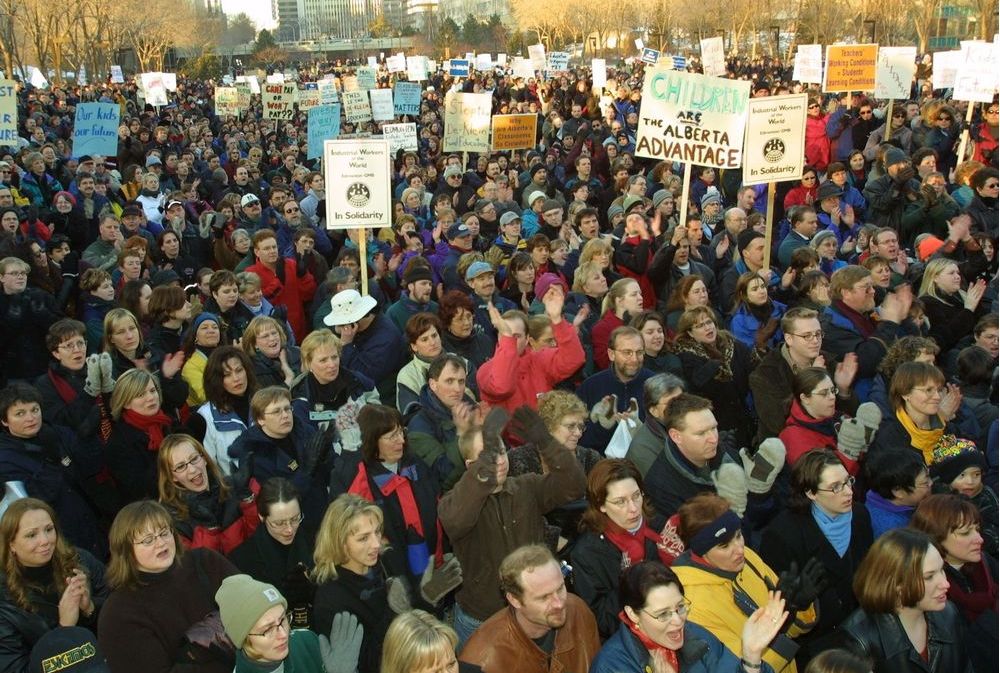 Striking teachers rally outside
the Alberta Legislature, Edmonton, February 7, 2002. Striking teachers rally outside
the Alberta Legislature, Edmonton, February 7, 2002.
In February 2002, 21,000 teachers in Alberta went on
strike
calling for increased funding for education. They demanded
classroom conditions that allow them to do their best work with
children. They also laid claim for wages and benefits they
consider acceptable, in particular claims that meet the needs of
younger teachers. Jonathan Techtmeyer described the situation in
a recent post on the Alberta Teachers' Association (ATA) website as
follows:
"On February 4, 2002 the largest teachers strike in the
history of Alberta commenced. Teacher discontent was boiling over
after years of education cutbacks, (including funding cuts, lost
teaching positions, lost resources and salary reductions)
followed by ongoing underfunding through the 1990s. Teachers
sought through collective bargaining to improve long-standing
concerns about deficient classroom conditions. Large class sizes
were a key concern."
Instead of taking up its social responsibility and
providing
the needed increased funding for education, the Klein government
used its police powers to declare an "emergency" ordering the
teachers back to work 19 days after the strike began. Two weeks
later the Alberta Chief Justice ruled that the government had not
demonstrated an "emergency" and declared both the back-to-work
order and the arbitration process contained in the decree null
and void.
What followed is called "rule of law" in Canada. The
government quickly brought in Bill 12, described by then-ATA
President Larry Booi as "one of the most gratuitous and
draconian pieces of labour legislation in Canadian history,
rushed through the legislature in only a few days." The
legislation imposed a rigged arbitration process and stripped
existing clauses from collective agreements protecting hours of
work and class size, prohibited strikes by teachers for an
extended period, and banned activities that could be deemed to be
promoting labour action.
Teachers responded by challenging the legislation in
court,
withdrawing voluntary services, and carrying out a vigorous
campaign to inform Albertans of what was at stake. Outrage at the
government's actions and broad support for the teachers forced
the government to amend the arbitration process and agree to
establish a Learning Commission to shine a light on classroom
conditions.
 The final report of
Alberta's Commission on Learning (ACOL)
was released on October 7, 2003. The report, Every Child
Learns, Every Child Succeeds, listed 95 recommendations for
achieving the commission's vision for education and identified
the increased investment needed at $600 million. It established
province-wide guidelines for average class sizes across each school
jurisdiction, but no recommendation that would require school
boards to meet those sizes. The final report of
Alberta's Commission on Learning (ACOL)
was released on October 7, 2003. The report, Every Child
Learns, Every Child Succeeds, listed 95 recommendations for
achieving the commission's vision for education and identified
the increased investment needed at $600 million. It established
province-wide guidelines for average class sizes across each school
jurisdiction, but no recommendation that would require school
boards to meet those sizes.
The report identified class size as one of the most
studied
areas in education and stated that "a wealth of research" backed
up views supporting smaller classes: "The critical point in all
of the research reviewed by the Commission is that class size
matters." This conclusion has been reinforced by all legitimate
studies since that time, and is particularly true where the
student population faces poverty, discrimination and
marginalization.
The ACOL's suggested guidelines are: 17 students for
K-3; 23
students for Grades 4-6; 25 students for Grades 7-9; and 27 students
at the high school level. Class composition was also to be
considered, for example classes with special needs and English
language learners or at-risk students should be smaller than
those set out in the guidelines.
Where does class size stand 17 years after the Learning
Commission's report was released? According to the Alberta
Auditor-General, by 2017-18, the number of jurisdictions meeting
the targets was actually lower than when the class size
initiatives began. The Auditor-General's office concluded that
class size funding had essentially become another layer of base
instructional funding.
The ATA points out that using averages is a way of
obscuring
the actual conditions of students and teachers. The ATA's
analysis of Alberta government data found that 80 per cent of
division one classes (K-3) are above the ACOL recommendation and,
on average, the oversized classes are nearly 30 per cent larger
than the recommendation. In total, nearly 17,000 Alberta division
one classrooms are oversized by more than 20 per cent. In higher
grades, 11,000 classes are 20 per cent larger than
recommended.
An investigation conducted by Edmonton Journal
reporter
Janet French in 2018 obtained hard data from six Alberta school
jurisdictions (two in each of Calgary, Edmonton and Red Deer).
The finding: more than 85 per cent of K-3 classes in these
districts were oversized. French's investigation found a Grade 10
math class with 45 students, a Grade 11 science class with 47
students and a junior high physical education class with 67. In
Red Deer, one Grade 5 class had 37 students, the ATA notes.
Edmonton Public had 457 classes with between 36 and 40 kids and
Red Deer Catholic had three classes in division one with 35 or
more students.
The ATA concludes: "Sixteen years have passed since
Alberta's
largest ever teachers strike, and the biggest issue in that
dispute, class size in Alberta's schools, is as bad as ever.
Teachers, and their supportive parents, were taking a principled
stand to protect the quality of education for Alberta's students.
Unfortunately those students never got to enjoy the small class
sizes they were promised. The students that were entering
kindergarten in 2002 are now graduating from university, and a
generation of children have missed out on the benefits of small
classes."
Teachers have had fidelity to their demands for better
teaching conditions, which are students' learning conditions, and
it is clear that they will continue their fight in the coming
years. By getting together, thinking things through, and speaking
out, they are sure to find a way forward.

Defending
Public Health and Seniors' Care
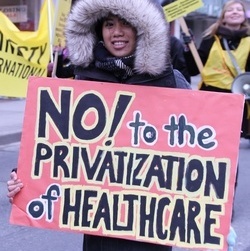 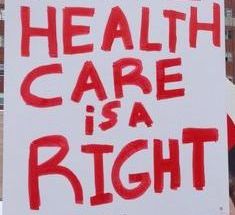
The Health Sciences Association of Alberta (HSAA) has
been carrying out its Health Matters campaign for over a year. The HSAA
campaign highlights the experience and knowledge of its members who
along with other public sector workers are the front line of defending
public health care and other social programs and people's right to have
such programs in a modern society. Health sciences members work in the
labs, in diagnostic imaging, in emergency medicine, in therapy, in
addictions and many other professions.
HSAA also carried out a campaign to increase the number
of
ambulances and paramedics in 2018 which resulted in increased
funding for Emergency Medical Services (EMS). At that time, HSAA
pointed out that while the number of EMS calls had increased by
nearly 20 per cent since 2010, the number of paramedics was up by
only 3.4 per cent.
"As experts, we know health-care cuts will cause immense
damage. The risk to health care -- and to Albertans -- is too
great for us to stay silent. As your trusted health-care experts,
we felt we had to speak out. Alberta needs to invest in a
health-care system that's already stretched, not cut it," HSAA
says.
"Alberta needs to stop the increased privatization of
care so
that every dollar is spent on patients, not diverted to boost
profits for large corporations. No one needing health care should
have to worry about whether or not they can afford care."
HSAA urges everyone to make health care an election
issue.
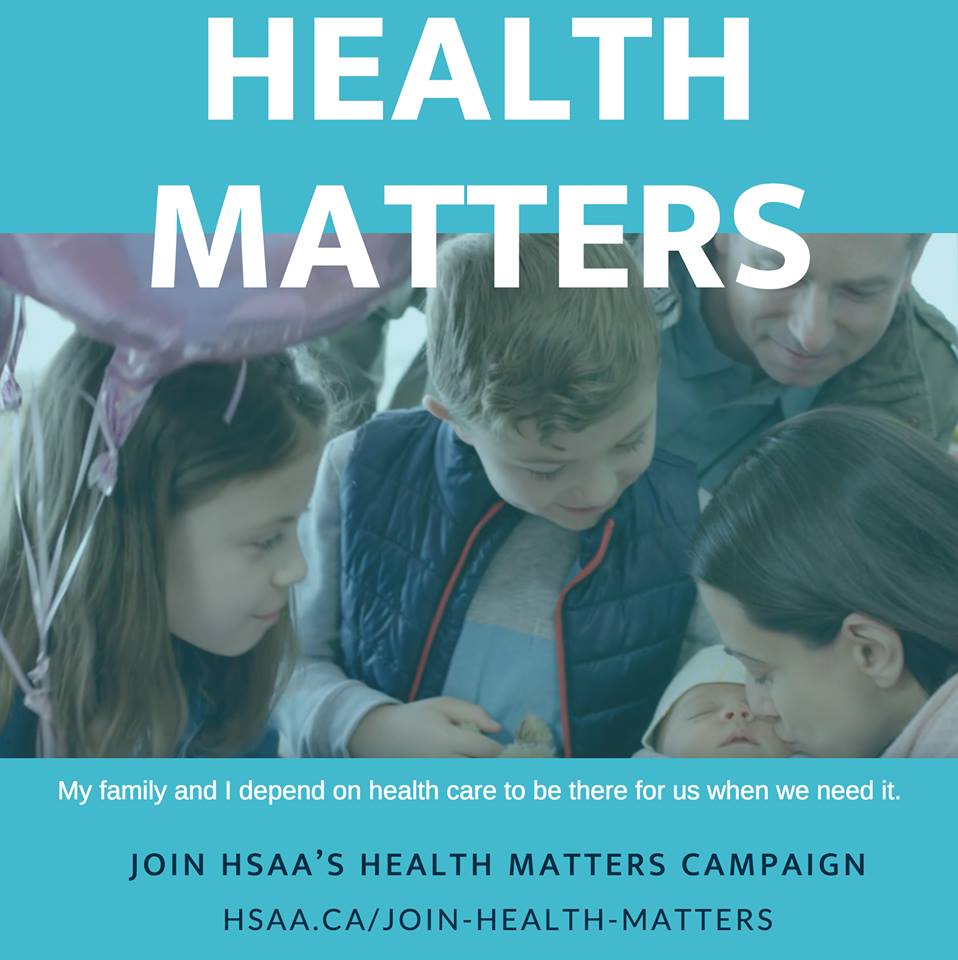 The Alberta Union of
Provincial Employees issued a press release on March 27, responding to
the NDP government's announcement that it would create 2,000 long-term
care beds throughout the province if elected. The Alberta Union of
Provincial Employees issued a press release on March 27, responding to
the NDP government's announcement that it would create 2,000 long-term
care beds throughout the province if elected.
"While more long-term care beds are sorely needed in
Alberta,
they can't continue to be funded by taxpayer dollars and
delivered by private, for-profit providers more focused on
revenues than providing quality care," said AUPE Vice-President
Susan Slade.
"The NDP knows public long-term care spaces provide the
best
care possible to seniors and residents. That's why in its 2015
election platform, it promised to create 2,000 public long-term
care beds over four years. "The party also called out the former
PC government for its 'costly experiments in privatization'
and called for funds to be redirected to publicly delivered
services in that same platform.
"Unfortunately, the private long-term care experiments
have
continued since 2015 and today we're seeing ‘public'
completely removed from the NDP's 2,000 long-term care beds
promise," said Slade. AUPE called on all political parties to
support and invest in publicly funded and delivered health
care.
The demands of the health care workers are just.
Increase
Funding for Health, Seniors' Care and Social Programs!

The question of who decides the direction of the
economy,
including health care and other public services has come to the
fore again with UCP leader Jason Kenney's announcement that he
would scrap the new publicly owned medical lab facilities to be
built in Edmonton. Kenney said a UCP government would "save" $650
million by scrapping the new facility, calling it a "bureaucratic
empire."
All Albertans have a stake and therefore the right to a
say
when it comes to handing over such a crucial public asset to
private interests. Dedicated, knowledgeable and experienced lab
workers and professionals should be on the front line when it
comes to decision-making regarding their sector of work.
 In 2015, Alberta Health
Services announced it would contract
an Australian company which started as a penny-stock mining
company to build a new lab in Edmonton to serve northern Alberta.
The decision was made after the group established to make
recommendations was ordered not to consider a public lab. The
ensuing decision was broadly opposed and the NDP government
reversed it through a process which permitted all options to be
considered. In 2015, Alberta Health
Services announced it would contract
an Australian company which started as a penny-stock mining
company to build a new lab in Edmonton to serve northern Alberta.
The decision was made after the group established to make
recommendations was ordered not to consider a public lab. The
ensuing decision was broadly opposed and the NDP government
reversed it through a process which permitted all options to be
considered.
Health Sciences Association of Alberta (HSAA) President
Mike
Parker explained that this process concluded that a publicly
owned and operated province-wide laboratory operation was the
best, most efficient way to go. HSAA represents medical lab
staff.
"UCP leader Jason Kenney demonstrated an appalling
ignorance
over how health care works in his statement on laboratory
services in Alberta," Parker said."It's hard to believe that
someone with so little understanding wants to be trusted with
running our vital health-care service. Kenney's plans for lab
services reveals so many misconceptions, mistakes, misleading
statements and insults to health-care experts that it's hard to
know where to begin when analysing what he said...," Parker
added.
"He says that labs don't heal people. What on earth does
he
think we do in labs? We do the tests that provide the diagnosis
so people can be treated. Labs and the trusted health-care
experts who work in them are a vital part of the health-care
system. Without their skills, doctors are just guessing." Parker
also pointed out that the claims that a new lab are not needed
are ill-informed, and that lab facilities are stretched to the
breaking point. A new lab will have to be built, he pointed out.
The only issue is whether it will be based on the motive of
private profit or be publicly owned and operated.
 Facts show that far from
"saving money" Kenney is
proposing to
seize more of the social wealth to line the pockets of the rich.
Under the deal made with the private company Sonic in 2015, Sonic
would finance the land and building for a new lab. They would be
repaid the fixed investment of social wealth with interest and
guaranteed a profit from operating the enterprise. Alberta Health
Services would have to buy the facility and equipment if the
contract was not renewed after 15 years, even though Sonic would
have already been repaid its invested social wealth with
interest, not to speak of the operating profit, which is lost to
the public. Facts show that far from
"saving money" Kenney is
proposing to
seize more of the social wealth to line the pockets of the rich.
Under the deal made with the private company Sonic in 2015, Sonic
would finance the land and building for a new lab. They would be
repaid the fixed investment of social wealth with interest and
guaranteed a profit from operating the enterprise. Alberta Health
Services would have to buy the facility and equipment if the
contract was not renewed after 15 years, even though Sonic would
have already been repaid its invested social wealth with
interest, not to speak of the operating profit, which is lost to
the public.
Scrapping the public lab would be the first step in
reviving
the schemes for a lab built with the motive of private profit.
Such schemes should be recognized for what they are -- a form of
corruption -- and banned by law. Instead, the value generated
within social programs and public services such as lab services
must stay within the public health care sector or be used to
enhance other public services and social and material
infrastructure and be available to protect the well-being of
health care workers.

Friends of Medicare (FOM) and Public Interest Alberta
(PIA)
launched a joint campaign, Alberta Seniors Deserve Better, in
March 2019 to put forward solutions to the problems facing
seniors in the continuing care system. The campaign calls on the
government to get profits out of seniors' care, and to enact
patient-staff ratios to deal with the unsustainable workloads
which lead to burnout for the staff, and degrade the quality of
care and attention for seniors in care. The campaign was launched
with four videos as well as a petition calling on all parties to
make strengthening seniors' care a top priority.
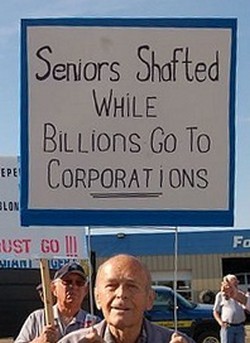 "Albertans value public
services, and they need to be
strengthened, not cut" said Joel French, PIA Executive Director.
"Our seniors deserve a robust public system that provides high
quality care. Some politicians are promising tax cuts to large
corporations and the wealthy, but our government should be
focussed on investing in proper care for Alberta's seniors who
have worked hard their entire lives to contribute to our
province." "Albertans value public
services, and they need to be
strengthened, not cut" said Joel French, PIA Executive Director.
"Our seniors deserve a robust public system that provides high
quality care. Some politicians are promising tax cuts to large
corporations and the wealthy, but our government should be
focussed on investing in proper care for Alberta's seniors who
have worked hard their entire lives to contribute to our
province."
Noel Somerville, Vice Chair of PIA's Seniors'
Task Force, who
appears in one of the videos, stressed the importance of creating
an easier-to-navigate continuing care system. "There are so many
barriers to families seeking proper care for their loved ones,
including a complex system of referrals. We need to build a
system that is easy to access," he said.
"Staff in the seniors' care system are stretched
incredibly
thin. In some facilities, one staff person can be responsible for
up to 30 residents," said Sandra Azocar, Executive Director of
FOM. "Working conditions are care conditions. We need legislated
staff-to-patient ratios to ensure quality care. Furthermore, we
need to take the profit motive out of seniors' care. Private
health care providers are putting more and more stress on seniors
and their families by piling on out-of-pocket costs for
essentials. Every dollar that goes into profit is one that's
taken away from quality care for seniors. Alberta Seniors Deserve
Better," Azocar said.
PIA points out that in the area of seniors' care,
Alberta's
seniors have long faced accessibility issues and increased
privatization of care sold to the public under the guise of
offering "choice" to patients and their families. "Rather than
building or upgrading publicly operated long term care, the
long-standing trend in Alberta has been to close public long term
care facilities. This renders the promise of "choice" a mere
illusion. Previous governments turned seniors' care into a
hospitality industry, in which companies profit from those that
need a hand. Slowly, we have transitioned to a system where more
and more of the cost is passed down to the residents and their
families."
Referring to Premier Notley's announcement that the NDP
would
add 2,000 new beds if re-elected, PIA pointed out that there has
been no assurance that the beds would be publicly, not privately
operated. Of 2,000 beds added since 2015, 1,700 are privately
owned and operated.[1]
"We are calling for a fundamental cultural change in
seniors'
care, a move away from the culture of corporatization." says
Sandra Azocar, Executive Director of Friends of Medicare. "We are
calling for changes in provincial policy to reflect the values of
public health care, to embrace clear provincial standards that
will improve access to care, and to establish ways of assessing
quality of care that our seniors receive."
The videos can be seen at www.abseniors.ca
Note
1. Many of these
beds were built under a program where private interests receive
grants to subsidize the building of privately owned and operated
supportive-living facilities. Others are private facilities which
were not built by the government.

Protecting
Water -- An Election Issue

Well-digging taking place near the Clearwater River.
Residents of Clearwater County in Alberta have been
waging
a fight to protect the Clearwater River, a tributary of the North
Saskatchewan River which supplies drinking water for the
prairies. The Clearwater River is located near Rocky Mountain
House in central Alberta.
The global energy giant Repsol Oil and Gas Inc.[1] applied to the Alberta Energy
Regulator (AER) in March 2018 for a 10 year licence to divert up
to 1.8 billion litres of water per year, not including other
temporary licences from the Clearwater River. The water will be
used for hydraulic fracturing (fracking) with 280 wells drilled
over 18 years. This is more water than the total amount used by
all current fracking operations in the county, residents point
out.
Organizers of the group formed to protect the water
point out
that their community was not even notified about the application
because they were not considered "direct stakeholders." This
shows how the conception of public interest has been stripped
from legislation governing the regulatory bodies, and the
arbitrary powers of the regulator to decide when and whom to
inform of an application before it.
Two women who have lived in the area for many years
decided to
knock on doors and inform their neighbours when they became
aware of Repsol's application. As a result of their efforts, more
than fifty residents came together to oppose the application, and
to urge the province to require Repsol to use recycled
wastewater.
Organizers stress that they are uniting in action
irrespective
of their "political stripe" to protect an important water supply
and aquifer. They explain that they are not opposing the oil and
gas industry, and indeed include people who have worked in the
industry all their lives. "I never said I was against oil. I just
know that we can't live without fresh water," one activist
said.
The regulator dismissed the residents' concerns and
approved
Repsol's application in January 2019. Alberta Environment
defended the decision, stating that "water diversion licences are
granted to applicants when sufficient water is available to meet
both ecosystem requirements and the rights of existing licence
holders."
The term "water diversion" is extremely misleading.
Fresh
water used for fracking is injected deep into the ground to
displace the oil and gas that is being drilled and most of the
water remains there. A study conducted at the University of
Alberta and funded by Natural Resources Canada concluded that
most water used in fracking is not recovered. The study states,
"It was determined that up to 30 per cent of water injected during
hydraulic fracturing can be recovered to the surface after
flowback operations. The remaining water appears to be trapped in
the rock matrix and complex fracture network."[2]
At minimum, 70 per cent of the fresh
water
used will not be recovered.
This is what is so concerning to residents. The water is
not
only being withdrawn from the river, but from hydrologic cycle.[3] Water that does
return
to the surface is contaminated with fracking fluid and very
expensive to remediate. This water is hazardous to humans if it
contaminates drinking water, as well as to aquatic life.
Clearwater residents are continuing and expanding their
fight
and speaking to other communities in Alberta to alert people to
the dangers and the need to protect the water supply for the
prairies. Most recently, citizens active in the Clearwater
Coalition made a presentation sponsored by the Warburg Pembina
Surface Rights Group in Warburg, a community southwest of
Edmonton.
Fracking and Earthquakes
Another serious concern about fracking is that it is
causing small and medium-sized earthquakes. Repsol shut down its
fracking operations near Fox Creek in 2016 due to a 4.6 magnitude
earthquake caused by hydraulic fracturing near a fault system which was
not previously identified. Hundreds of small and moderately-sized
earthquakes have taken place in the Fox Creek area in recent years
since fracking operations began.
A study published in the journal Science, shows that
small
earthquakes can continue to occur months after fracking has stopped,
occurrences which are not addressed anywhere in Alberta
regulations.
"Balancing the Economy and the Environment"
 The energy regulator has
made the well-worn claim that it is
balancing the economy and the environment. In fact neither the
problems of the economy or the need to defend Mother Earth are
being addressed. The energy regulator has
made the well-worn claim that it is
balancing the economy and the environment. In fact neither the
problems of the economy or the need to defend Mother Earth are
being addressed.
The outlook that taking care of Mother Earth including
water
and development of the socialized economy are innately in
conflict is nonsense. Humanity is part of nature, not separate.
Humans depend on nature and through work, transform nature to
serve their needs. But the relationship between humans and nature
is reduced to what the oligopolies like Repsol have decided suits
their private interest and motive for maximum private profit.
The stranglehold of the oligarchs over decision-making
and the
motive of production for private profit is harmful to humans and
to Mother Earth. Both Mother Earth and human beings who are part
of nature require a solution to this problem. The block is the
domination by the financial oligarchy and capitalist system under
which Mother Earth and human beings become collateral damage to
greed and the pursuit of private interests.
The people must become the decision-makers and set the
direction of the economy in a manner that protects the
environment and affirms the right to be of the peoples of the
entire world.
Notes
1. Repsol Oil and Gas
Canada Inc. is a subsidiary of the Spanish global corporation
Repsol S.A. Originally known as B.P. Canada Ltd., the company was
renamed Talisman Energy when B.P. sold off its majority ownership
in a public offering. Talisman became one of Canada's largest
independent oil and gas companies. In turn, Talisman was bought
out by Repsol for approximately U.S.$13 billion in 2015. Repsol had
net income of CDN $2.319 billion in the first half of 2018.
2. Understanding the Fate of
Non-recovered Fracturing Water and the Source of Produced Salts
for Optimizing Fracking Operations, University of Alberta, 2017,
Natural Resources Canada.
3.
The Merriam Webster Dictionary
defines the hydrologic cycle as:
"the sequence of conditions through which water passes from
vapour in the atmosphere through precipitation upon land or water
surfaces and ultimately back into the atmosphere as a result of
evaporation and transpiration."

Opposition to Anti-Social Offensive
Continues in
Ontario

Queen's Park rally April 6, 2019 says No!
to Ford government's cuts to education.
Two mass actions were recently held in Ontario
by
those concerned about the direction of public education. On April 6, a
mass rally of teachers and education workers and their supporters was
held at Queen's Park to defend the public education system. This was
preceded by a province-wide walkout on April 4 organized by students to
clearly express their No! to the Ford government's
retrogressive changes to K-12 and post-secondary education.
Rally for Education at Queen's Park
 On April 6, more than
34,000 teachers and education
workers,
students, parents, children and the general public converged on
Queen's Park for a rally to express a clear No! to the
Ford government's anti-social attacks on education. From as far
north as North Bay and as far south as Windsor, buses poured into
Toronto while Torontonians and those in the GTA drove in or
flooded into public transit. Everywhere red shirts symbolizing
the slogan #RedforED could be seen. Like the province-wide
walkouts, the rally had a jubilant fighting spirit making it
clear that the people were speaking for themselves and putting to
rest any claim that the direction proposed by the Ford government
has any form of broad support. Organizers report that this was
the most buses they had seen at Queen's Park in many years. On April 6, more than
34,000 teachers and education
workers,
students, parents, children and the general public converged on
Queen's Park for a rally to express a clear No! to the
Ford government's anti-social attacks on education. From as far
north as North Bay and as far south as Windsor, buses poured into
Toronto while Torontonians and those in the GTA drove in or
flooded into public transit. Everywhere red shirts symbolizing
the slogan #RedforED could be seen. Like the province-wide
walkouts, the rally had a jubilant fighting spirit making it
clear that the people were speaking for themselves and putting to
rest any claim that the direction proposed by the Ford government
has any form of broad support. Organizers report that this was
the most buses they had seen at Queen's Park in many years.
The rally opened with representatives of high school
students
who organized the walkouts who rebuked Premier Ford's provocative
claim that the walkouts were organized by teachers' unions, whom
he called "thugs." The students openly declared not only that it
was their initiative but that they are not asking but demanding a
real say in the direction of the education system that educates
them and that they support the same for all those who work in
public education. Representatives of families with children who
have autism also spoke of their confidence in the movement that
was being built and that they stand as one with everyone who
wants to improve public education. Representatives of the main
Ontario education unions also spoke affirming that their members'
working conditions are students' learning conditions and that
this is the basis upon which they support the students. The
entire caucus of the NDP joined the rally with NDP leader Andrea
Horwath stating that they would fight up until the next
provincial election when she said they would defeat the PCs and
form the government. Chris Buckley of the Ontario Federation of
Labour addressed participants as did Canadian Labour Congress
President Hassan Yussuff. Both rebuked the Ford government for
its attacks on unions labeling them "thugs," affirming that the
trade union movement would not be threatened or intimidated.
The stands of the people of Ontario affirming education
as a
right and the modern view that education is an investment rather
than a cost were clearly expressed in the thousands of homemade
signs in the rally. What has clearly been established in the
minds of those gathered was that the direction the Ford
government intends to take Ontario is not acceptable and must be
challenged. The rally and the walkouts have further strengthened
the sentiment that it is up to the working people themselves to
hold governments to account and how to do this begins by saying
No!
Province-Wide Student Walkout
Students from all parts of the province walked out en
masse on April 4 in an enthusiastic expression of their
determination to
have their voices heard.
Many school boards across the province
deliberately did not intimidate or seek to threaten students into
not participating. In some cases school board administrations
facilitated students expressing themselves by establishing time
frames for the walkout within which students would not be marked
truant. As a result, students were not forced to defy
administrators and instead were able to walk out together in a
calm and jubilant atmosphere.
Photo Review: April 6 Rally for Education

  
 
  
 
  
 
  

Photo Review: April 4 Student Walkout
Napanee

Ottawa

Wellborne Ave Public School, Kingston

VP Carswell Elementary, Trenton

Bowmanville

Whitby

Codrington Public School, Barrie

Innisdale Secondary School, Barrie

Harbord Collegiate, Toronto

Spadina-Fort York, Toronto

Lakeshore Collegiate, Etobicoke

Richview Collegiate, Etobicoke
 
Etobicoke

Port Credit Secondary School, Mississauga

Fort Erie

Vincent Massey Secondary School, Windsor
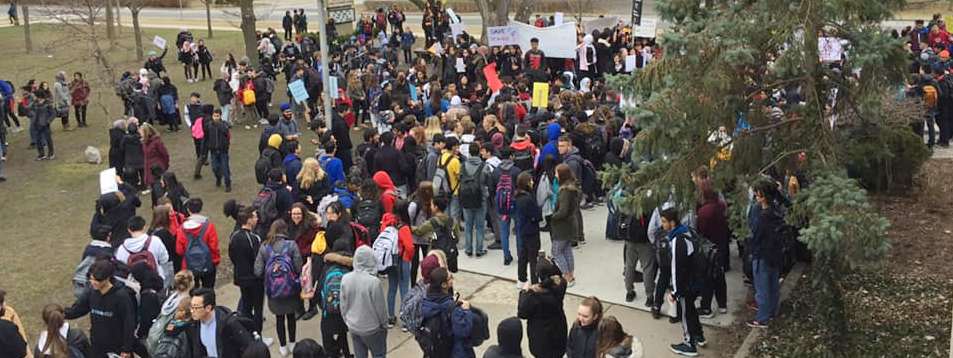
Essex District High School


Sudbury

Mattawa

Blind River

Elliot Lake
  
Sault Ste. Marie

Thunder Bay


Hands Off Venezuela!

President Nicolás Maduro addresses a mass rally, April 6, 2019,
congratulating the Venezuelan people on their defence of their
motherland.
With the continuing failure of the U.S. to bring its
coup d'état against the government of the Bolivarian Republic of
Venezuela to a successful conclusion in spite of the dirty
multi-faceted war it has been waging for that purpose, it is going to
new extremes to try and legitimate its illegitimate activities and
shore up support internationally for the hapless self-proclaimed
"president" Juan Guaidó.
On April 9 at an extraordinary session of the Permanent
Council of the Organization of American States (OAS), requested
the day before by seven Lima Group members including Canada, a
resolution was approved by a simple majority of 18 votes[1] that
called on the OAS
to accept an individual designated by the disempowered National
Assembly as Venezuela's permanent representative to the OAS,
"pending new elections and the appointment of a democratically
elected government." The resolution further instructed the OAS
Secretary General to transmit the text that had been approved to
the Secretary General of the United Nations, in keeping with the
concerted effort of the U.S. to get the Security Council to act
against Venezuela.
It was pointed out emphatically by the representative of
the
Bolivarian Republic of Venezuela and others who voted against the
resolution, and even by some who abstained, that the Permanent
Council had no authority under the OAS Charter to determine who
should represent any of its member states, that this was a
decision belonging to the member state itself.
Sir Ronald Sanders, Antigua and Barbuda's Ambassador to
the
OAS pointed out that "in international law and practice, who
represents a state is based on the test of "who is in charge of
the country, who administers its affairs, [and] who controls its
borders." Given that a fictitious parallel "government" headed by
a self-declared "president" without any real power obviously does
not fulfil these requirements, he said that essential test of
international law had been ignored, and requested that his
remarks be included as a footnote to the resolution.
The response of Venezuela's representative Asbina
Marín
Sevilla and of certain others who objected to the resolution also
appeared as footnotes to the resolution that appeared on the OAS
website. In her remarks Marín Sevilla stated:
"The only measure provided for in the rules of the OAS
is the
suspension of a member state, decided on at a special General
Assembly by a two-thirds vote of the foreign ministers. There is
no other way. The power to withdraw recognition does not exist,
much less the power to change governments. Any improvisation or
manipulation that allows other actions to be taken by a lower
body and with a voting threshold below two-thirds is illegal....
We are thus facing two coups d'état: one committed against all
the principles of the OAS, and another committed from within the
OAS against a state that is facing intervention and upon which a
representative is being imposed from abroad."
The OAS "has been turned into an empty shell, powerless
to defend its own principles," said Marín Sevilla, proving that
her government's decision to withdraw from it was correct. Venezuela is
due to leave the OAS on April 27, two years after giving notice of its
intention to do so.
Ambassador Jorge Lomónaco of Mexico who voted
against
the
resolution called its adoption "a pyrrhic victory for a group of
countries, without real effect." Saying the decision had been
taken "irresponsibly and without legal grounds," he expressed
concern about its implications. Similar concerns were expressed
by representatives of countries that abstained on the vote as
well, including Nicaragua and Guyana.
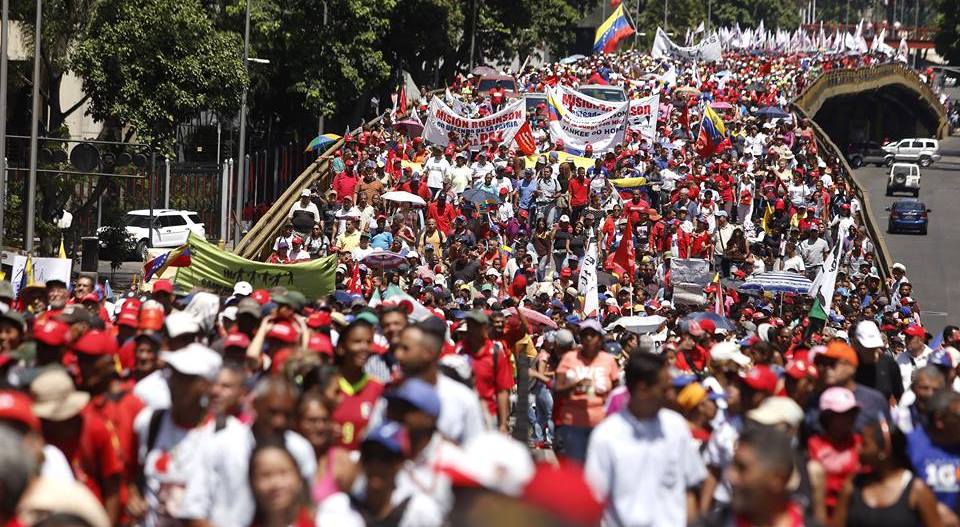
Caracas, Venezuela, April 6, 2019.
At the UN Security Council
On April 10 the U.S. moved its regime change sideshow to
the
UN Security Council where it demanded that an emergency session
be convoked allegedly to consider the "humanitarian problems" in
Venezuela -- the third such meeting it has forced in less than a
year.
The meeting began with reports by the UN
Under-Secretary-General for Humanitarian Affairs Mark Lowcock,
the Joint Special Representative of the United Nations High
Commissioner for Refugees and the International Organization for
Migration for Venezuelans, Eduardo Stein,[2] and Dr.
Kathleen Page,
a professor at Johns Hopkins University's School of Medicine who
reported on a study carried out by her university in conjunction
with the U.S. government-financed agency Human Rights Watch. All
of them painted a dire picture about the "humanitarian situation"
in Venezuela without mentioning a single word about the role of
the economic war the U.S. has been waging aimed precisely at
creating a crisis in the country.
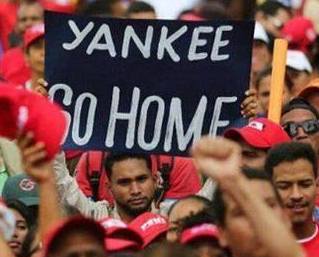 Pence then took the floor
in the style of a self-appointed prosecutor, calling Venezuela a failed
state and its government "illegitimate," making sure to include that
Venezuela represented "a threat to the peace and security of the
region," emphasizing that it was time for the UN to "act" -- a
dishonest attempt to make the case for an eventual military
intervention like the U.S. has been threatening, and which Pence made
sure to say was still "on the table." He announced that the United
States was drafting a resolution calling for the UN credentials of the
Bolivarian government to be revoked and assigned instead to the coup
forces it sponsors, and called on all states to support it, presumably
at a future meeting of the General Assembly even though not even a
third of its members have recognized its puppet Juan Guaidó as
Venezuela's president. Pence then took the floor
in the style of a self-appointed prosecutor, calling Venezuela a failed
state and its government "illegitimate," making sure to include that
Venezuela represented "a threat to the peace and security of the
region," emphasizing that it was time for the UN to "act" -- a
dishonest attempt to make the case for an eventual military
intervention like the U.S. has been threatening, and which Pence made
sure to say was still "on the table." He announced that the United
States was drafting a resolution calling for the UN credentials of the
Bolivarian government to be revoked and assigned instead to the coup
forces it sponsors, and called on all states to support it, presumably
at a future meeting of the General Assembly even though not even a
third of its members have recognized its puppet Juan Guaidó as
Venezuela's president.
After issuing his uncouth threats and demands at the
Security Council, Pence made a show of walking out of the meeting, not
bothering even to hear what Venezuela or other members of the Security
Council had to say in response. Speaking to reporters outside he
blustered impotently, "This is our neighborhood and the president has
made it clear that whether it be Russia, or whether it be other
nations, that they need to step aside. They need to cease efforts to
stand in the way of economic and diplomatic pressure, and they need to
cease supporting the Maduro regime."
At a press conference he held after the meeting,
Venezuela's
Permanent Ambassador to the UN Samuel Moncada said it is no
secret that the U.S. has been running a high pressure campaign
for some time to try and get more of the 193 UN members to buy
into its regime change agenda by recognizing its puppet Guaidó
as
the legitimate president of Venezuela. While that might work in
the OAS, whose Secretary General openly calls for war against
Venezuela, he said, it's not the same at the UN which is not just
"a corral of the U.S. and its friends." Moncada said Venezuela
had also been engaged in a vigorous campaign with members of the
Non-Aligned Movement for the last six months to counter U.S.
attempts to unseat its delegation at the UN and that this would
continue.
Notes
1. The resolution was
approved by Argentina, The Bahamas, Brazil, Canada, Chile,
Colombia, Costa Rica, Dominican Republic, Ecuador, Guatemala, Haiti,
Honduras, Jamaica, Panama, Paraguay, Peru, Saint Lucia and
the United States. Nine countries voted against it -- Antigua and
Barbuda, Bolivia, Dominica, Grenada, Mexico, Saint Vincent and
the Grenadines, Suriname, Uruguay and Venezuela, and six
abstained -- Barbados, El Salvador, Guyana, Nicaragua, Saint
Kitts and Nevis, and Trinidad and Tobago. Belize was absent.
2. Eduardo Stein is a former vice
president (2004-2008) and foreign minister (1996-2000) of Guatemala. He
currently sits on the Board of Directors of the Washington-based
Inter-American Dialogue. Of note is that Stein was a member of the
International Commission on State Sovereignty and Intervention (ICISS)
established by Canada in 2000 after NATO’s precedent-setting bombing of
Yugoslavia. The Commission came up with "the responsibility to protect"
(R2P) to justify foreign intervention against sovereign states -- a
violation of the UN Charter. In its report to then-Secretary General
Kofi Annan the Commission recommended the UN adopt R2P as official
policy. Stein is said to remain an advocate of that imperialist
doctrine which the likes of Luis Almagro and members of the US-financed
opposition in Venezuela have called for utilizing today against
Venezuela.

- Sir Ronald Sanders, Ambassador of
Antigua and
Barbuda to the OAS -
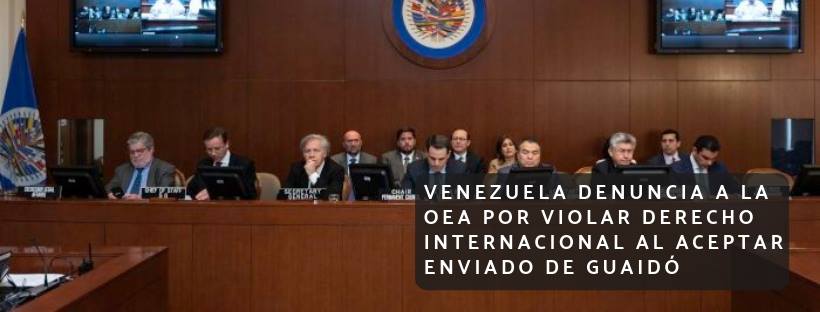
The organization of American States (OAS), already a
broken
institution, was shattered even more April 9 at a meeting of its
permanent council. It is now an organization whose membership is
deeply divided and amongst whom mistrust, and bitterness now
predominate.
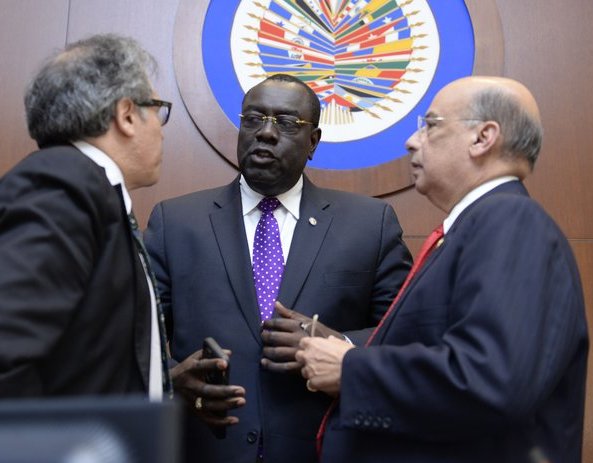
Sir Ronald Sanders, (right), at OAS meeting.
|
How this huge problem will be fixed -- if it can be
fixed
at all -- is the paramount challenge that now confronts its
33 and a half members. I will return to the half-member later in
this commentary.
Nothing that I say in this commentary is a secret. The
permanent council meeting of April 9 was played out in a live
webcast on the OAS' website.
The meeting was held, after weeks of efforts by the
United
States and most of the members of the so-called Lima group, to
secure the adoption of a resolution that would unseat the
representative of the Nicolás Maduro government and replace him
with the nominee of Juan Guaidó. Guaidó is the
self-proclaimed "interim president" of Venezuela, so recognized
by roughly 50 of the more than 200 governments in the world.
The manoeuvrings behind the scenes had a single purpose,
and
that was to procure 18 votes, constituting a simple majority of
the 34 member-states, to impose Guaidó's nominee as
Venezuela's representative.
It took some time for the core 14 countries to woo the
support
of 4 others, not least because the manner of pushing the
resolution through the permanent council defied international law
and the charter and rules of the OAS. Governments had to dig deep
to balance disregard for the integrity of the OAS as an
institution and a desire to help those countries that were
determined to seat Guaidó's representative.
The meeting was summoned for high noon April 9, and all
delegations were cautioned to be on time for a prompt start. As
it turned out delegates were forced to wait until after 1:00 pm to
start the meeting because, at the last minute, Jamaica --
one of the faithful 18 -- insisted on new language, causing
a commotion among the group and threatening to derail its entire
effort.
Even when the resolution was presented to the permanent
council meeting and was being debated, it was unclear what text
was being considered. What was before the meeting was the
original text, omitting the Jamaica language. A request from me,
as the representative of Antigua and Barbuda, for clarification,
resulted in a break in the meeting's proceedings to produce the
final text of the resolution. Its primary purpose remained to
accept the appointment of "the national assembly's designated
permanent representative."
There was much solemn and serious debate about the
entire
proceedings, but in the end, 18 countries, using their razor-thin
majority, forced the vote through.
Some self-interested governments have characterised the
April
9 meeting as a clash of support for or against the contending
forces in Venezuela. Sections of the media have followed that
line.
However, far from being about Maduro/Guaidó and
Venezuela, the meeting was about selling or saving the soul of
the OAS; it was about disregarding international norms and
ignoring the institutional framework of the organization for the
short term political purposes of a few; and it was about arguing
for the retention of the OAS' integrity.
At the end of the vote, passed by a simple majority, the
ambassador of Mexico, Jorge Lomónaco Tonda, summed-up the
meeting well. He said: "There were no winners or losers; only
losers." Moreover, the biggest loser was the OAS itself.
Nowhere in the charter of the OAS, or its rules, does
the
permanent council have the authority to decide on the recognition
of a government. Further, as was stated repeatedly at the
meeting, the recognition of a government is the sovereign right
of states and cannot be determined or imposed by a multilateral
organization. At the very least, the matter, given its high
political importance, should have been considered by a special
session of the general assembly, the highest organ of the
OAS.
What the hasty, ill-considered process succeeded in
doing is
damaging the OAS as an institution, tainting its structure and
governance, harming relations between its member states and
rendering it unfit for anything but achieving the purposes of a
willful majority of 18 countries.
The vote on recognition of the national assembly's
representative was really about the de-recognition of the Maduro
government's representative. While that may have been achieved
within the OAS, it has changed nothing in the international
community. Countries that recognize Maduro or Guaidó as
president of Venezuela continue to do so.
Nothing has changed in Venezuela either. This vote has
achieved no new negotiations and no solution to the humanitarian
situation. If anything, it has served only to harden the opposing
sides in the political conflict, closing the door to
solutions.
To return now to the 33 and a half members of the OAS.
The
national assembly's representative may be seated in front of the
Venezuelan flag, but he cannot speak for the government that is
in charge of Venezuela. A vital test of recognition of a
government, in international law and practice, is whether it
exercises effective control of the affairs of the country. The
national assembly does not have effective control of Venezuela,
and its representative cannot speak, in the OAS, for the de facto
government.
There is a further question regarding the authenticity
of the
representative's credentials which appear to have been
overlooked, deliberately or otherwise by the OAS Secretariat.
The national assembly nominated a "special"
representative to
the OAS, but there is no such category of representation.
Further, as pointed out in the meeting by the ambassador of
Guyana, Riyad Insanally, the letter to the Secretary-General from
Guaidó, signed as "interim president of Venezuela,"
designating the "permanent" representative, was dated January 22,
2019. However, his proclamation as "interim president" took place
on January 23, 2019. In other circumstances, these discrepancies
would not have been accepted.
The OAS is now in many ways a sadly compromised
organization.
The fight on April 9, 2019, to sell or save its soul defines it
now and can limit its effectiveness in the future.
Why should we care? Because it is the only hemispheric
organization in which all countries (except Cuba) sit, and which
had the mandate and the opportunity to keep the region peaceful
and to pursue cooperation that could make a difference to the
lives of all its people. All that is now corrupted.

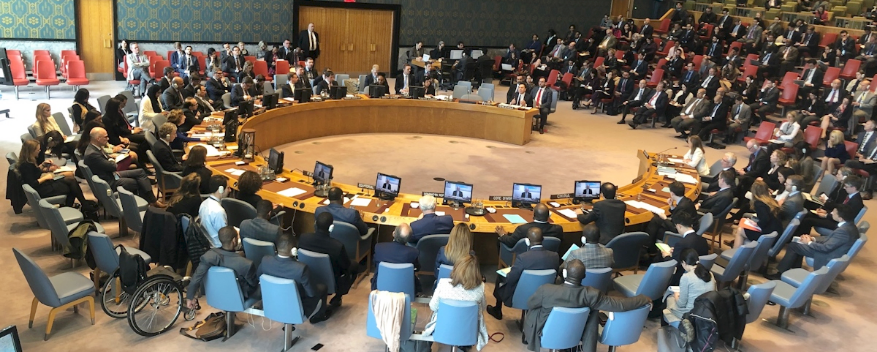
UN Security Council meeting, April 10, 2019.
Mr. President.
Pence is misleading the United Nations. Yesterday the
Organization of American States (OAS) did not accept the
designation of a new representative of the Bolivarian Republic of
Venezuela. What happened yesterday was that they accepted the
designation of a representative of the National Assembly, but it
is not clear what that person can do, as the OAS is an
Organization of States, represented by National Government, and
not of National Assemblies. This legal absurdity took place as a
result of the desires of Mr. Pence's government to carry out a
coup d'état in the OAS and another in Venezuela. As such, we
suggested that all parties become well-informed over what was
adopted yesterday in Washington. We warn that Mr. Pence's
government will try the same trick here, within the General
Assembly, and we trust that it will fail.
Mr. President.
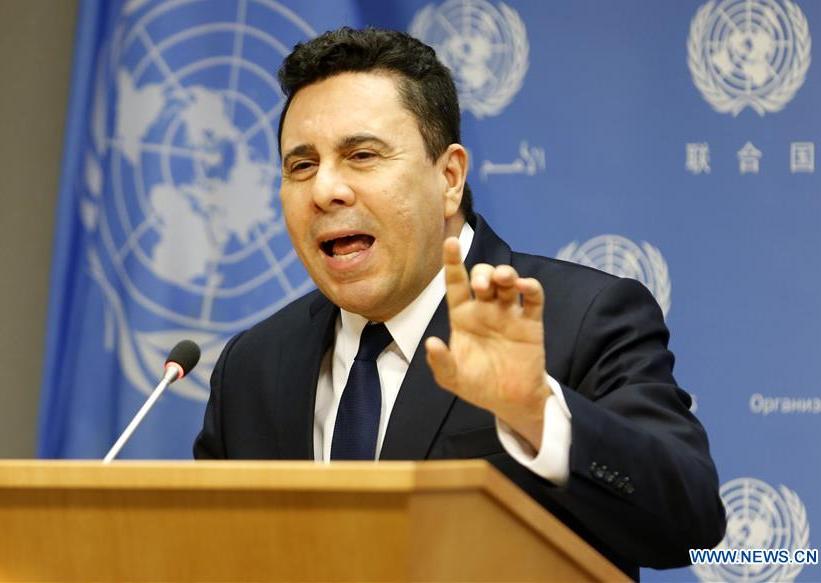
Ambassador Samuel Moncada speaks at press
briefing at the UN, April 10,
2019.
|
The humanitarian situation in Venezuela needs to be
resolved,
but if we err in the diagnosis, we will also err in the
treatment. The situation, as has been affirmed here, is the
result of human actions. But what has not been said is that these
actions are part of a plan for economic destruction designed by
the government of the United States and its ally, the United
Kingdom, with the goal of strangling the national economy,
causing maximum social suffering, eroding the capabilities of our
nation to sustain itself and, ultimately, to spark an implosion
that will allow for a foreign military intervention based on the
nefarious notion of the responsibility to protect, which has been
used as an excuse for colonial invasions of countries that have
oil.
This is a gigantic, inhumane experiment of
unconventional
warfare. A policy of calculated cruelty that violates human
rights on a massive scale, reaching the point of committing
crimes against humanity, all with the goal of justifying
pillaging and looting, imposing a local, subordinate government
and, in our case, using a racist ideology that arose over 200
years ago, when the United States was a slave-owning nation,
which today they promote in violation of international law. We
refer to the infamous Monroe Doctrine. Listen to their own
words.
On January 9, 2018, spokespersons from the State
Department
declared: "The pressure campaign is working And what we are
seeing is a total economic collapse in Venezuela. So our policy
is working, our strategy is working and we're going to keep
it."
On October 12, 2018, Ambassador William Brownfield said:
"We
must treat this as an agony, a tragedy that will continue until
it finally reaches an end ( ) and if we can do something to
accelerate it, we must do it, but we must do it understanding
that this is going to have an impact on millions of people who
are already having difficulties in finding food and medicines ( )
We cannot do this and pretend that it will not have an impact, we
have to make a hard decision, the desired end justifies this
severe punishment."
On March 7, 2019, Senator Marco Rubio stated that "Over
the
next few weeks, Venezuela is going to enter a period of suffering
no nation in our hemisphere has confronted in modern
history."
On March 22, 2019, John Bolton noted, "It's sort of like
in
Star Wars when Darth Vader chokes someone, that's what we are
doing to the regime economically."
This is about deliberate economic destruction; it is the
systematic application of aggression with the use of financial
instruments, undue pressure, and the use of dominant market
positions to influence the banking sector, private businesses and
other nations that engage in legal trade with Venezuela,
including even U.N. agencies. All with the goal of isolating the
country from international trade and financial systems. If it
were true that the Venezuelan government is killing its people,
why would they need a massive wave of extortion to increase
suffering? The interest in a social implosion is not ours; it is
of those who wish to invade us.
It is a plan in which banks, insurance agencies and
ships are
used with a destructive power comparable to weapons of mass
destruction, but without having those responsible face justice
and without them suffering the moral sanctions they deserve. On
January 30, 2019, John Bolton said: "My advice to bankers,
brokers, traders, facilitators, and other businesses: don't deal
in gold, oil, or other Venezuelan commodities," while on March
29, 2019, Elliott Abrams said: "We impose our sanctions. What
does the regime do? The regime tries to figure out other ways to
get around them. It tries to find new customers. It tries to find
new sources of imports. So, what do we do? We watch carefully,
and we can see ships moving and we can see new contracts with new
companies, and when we do, we talk to shippers or we talk to
refiners or we talk to governments and we say you should not be
doing that. That's what we're doing."
A repugnant aspect of this criminal policy of mass
destruction
is that it is accompanied by theft and pillaging that has cost
our nation over $137 billion. While they deprive our people of
essential goods, provoking maximum suffering, they rob the
Venezuelan people of over one hundred billion dollars. The
profits from our refineries are used to pay debts to oil
companies friendly to the Trump administration. Its friends with
Venezuelan sovereign debt bonds receive special licenses to
collect their profits from money stolen from our people. They
announced a plan to put the country into debt by $70 billion and
to use that money to pay for non-certified debts in suspicious
financial dealings. We cannot forget that the Bank of England,
which stole $1.2 billion in old from our people using the excuses
that they do not recognize President Nicolás Maduro and that
they
are complying with the Trump sanctions. The Bank of England is
not an independent institution, as its government affirms; rather
it acts as the enforcement arm of policies of conquest and
pillage of the governments of Trump and Theresa May. It is the
same colonial policy of the British Empire of over 200 years
ago.
Mr. President.
This is the true cause of the Venezuelan situation;
there is
no other. Certainly, our people our suffering and our government,
as the Secretary General can certify, is working intensely with
the United Nations system to increase both the number of
cooperation projects as well as the volume and capacities of
those projects, particularly in the health, food, education,
electricity and transportation sectors. The same is happening
with regards to cooperation with the International Committee of
the Red Cross, whose president met yesterday in Caracas with our
Head of State to move forward with a direct mechanism that
facilitates true neutral, impartial and independent aid. The same
can be said of friendly countries who have provided assistance in
peace and in respect for our sovereignty.
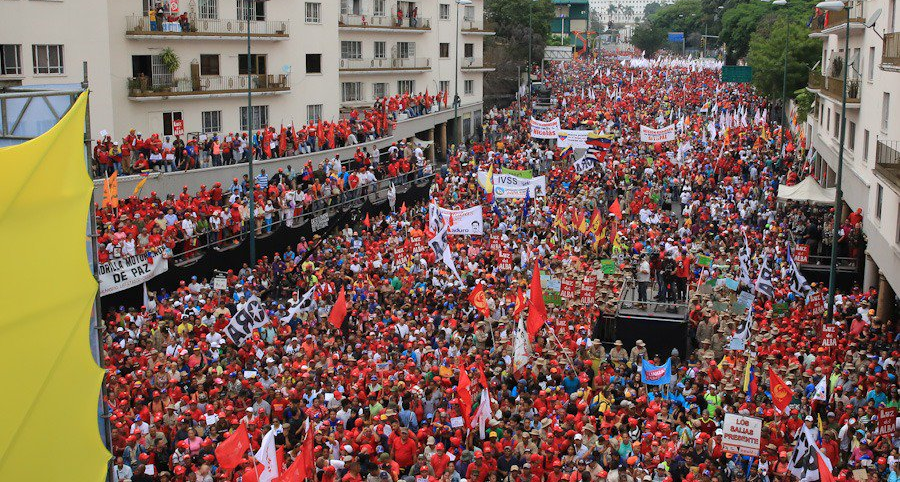
Anti-imperialist march in Caracas, Venezuela, March 30, 2019.
An element that can not be underestimated by those who
wage
war on Venezuela is the strength of our national spirit, which is
growing in the midst of these difficulties. The macabre
experiment of destruction is aiming to prove that economic crime
does work, that peoples can be broken and will surrender in the
face of an oppressive foreign power. However, they got it wrong
in Venezuela. The induced collective suffering is being resisted
with the growing organization of our people. Our National
Bolivarian Armed Force has not fractured and is more united than
ever. Our workers are reacting to the attacks against our vital
infrastructure with a discipline that the aggressors had never
seen. Yes, there are troubles, but they are not leading to a
civil war. Today, our people are setting an example for the world
on how to fight for peace.
It would be logical to think that the efforts of our
government to overcome the difficulties caused by aggression
would be recognized and supported by the international community
interested in alleviating suffering. However, what we are
witnessing is a new wave of economic extortion that severs our
country's financial flows abroad and impedes action by the United
Nation's own agencies, which at this time have not found a way to
receive our money and process the purchases required to meet the
needs of our population. Do you know why? Because the Trump
administration is waging a terror campaign against commercial and
financial agents that touch Venezuelan money. What the United
States has attempted to do so far is not humanitarian aid, but a
covert operation without the consent of Venezuela, violating our
territorial integrity, with a continuous threat of the use of
force, and openly inciting a military uprising and civil war.
This is Mr. Abrams' specialty.
Mr. President.
This Security Council, according to the provisions of
Articles
24, 34 and 39 of the Charter, has the responsibility to maintain
international peace and security and to determine the existence
of threats to peace or acts of aggression. As such, we request
that it determine:
The legal basis on which the United States and United
Kingdom
apply a program of economic destruction on Venezuela, without the
express authorization of this Council.
The legal authority to apply the so-called secondary
sanctions
on countries that legally trade with Venezuela.
The legal basis on which the United States threatens
Venezuela
with the use of force.
The legal authority on which the United States and
United
Kingdom can appropriate our riches, making profits through
extortion with the mass violation of the human rights of our
people.
The legal basis on which the United States can intervene
in
affairs that are essentially under the internal jurisdiction of
Venezuela.
To conclude, the diagnosis for the current situation is
the
result of a campaign of aggression by the United States and
United Kingdom. The treatment cannot be a new dose of aggressive
interventionism with a humanitarian façade. The solution is not
found in donations from those criminals who wish to portray
themselves as saviors; it is not in corridors of humanitarian aid
designed to provoke armed conflicts; it is not in Donor
Conferences that obscure the looting of our nation. The treatment
is in returning the money stolen from Venezuela; in the end of
the commercial and financial blockade of our people; in the end
of the sabotage to our infrastructure through covert operations;
in the end of threats of military intervention; and in the end of
threats against Venezuelans who wish to engage in dialogue. We
must stop Trump's war. This Security Council must fulfill its
mission, guaranteeing Venezuela its right to peace.
Thank you.
Right to reply to the address by the delegation of Peru
to the
United Nations on the issue of Venezuelan refugees and
migrants:
Even when they are surprisingly ignored by reports
referred to
here in this session, including those drafted by U.N. agencies,
the criminal, unilateral sanctions have also resulted in an
irrefutable increase in the migratory flow of Venezuelans,
although we differ on the number mentioned here, considering that
there has been a lack of due rigorousness in the methods to
acquire such information, nor the timely and verifiable provision
of migration data by receiving country.
We should note, fortunately, that Venezuela has not been
a
recent victim of either a natural catastrophe or an armed
conflict. The migration that we see today in the region, which is
encouraged by extremist statements and by a psychological war
that instills terror regarding the certainty of the future in
Venezuela with the goal of weakening the morale of our people, is
of an economic kind and is the direct result of a plan for the
programmatic destruction of our economy.
We cannot allow a human right like freedom of movement
to be
securitized or politicized. On the country, this very Security
Council would be engaging in a double standard in not promptly
convening a session on the humanitarian and security crisis on
the border, as declared by Trump on March 15, 2019.

The Brexit Fiasco
With every move she makes, British Prime Minister
Theresa
May has deepened the political crisis over Brexit. But the
underlying crisis is something much more profound than May's
politics of self-harm, denial and plain irrationality. In other
words, even if May were to be replaced as Conservative Party
Leader and Prime Minister, the crisis is not going to be
resolved, certainly not within the Tory Party and in the House of
Commons as a whole, or even within the parameters of a cartel
party system in which the people have no say over the decisions
which affect their lives. Far from it. Objectively, the way out
of the crisis is the one which genuinely empowers the people to
have a say in those decisions. Already, the peoples of the entire
country from all walks of life are very vocal as to what they
want but nobody listens despite everyone speaking in their own name.
This is what has to be made to change.
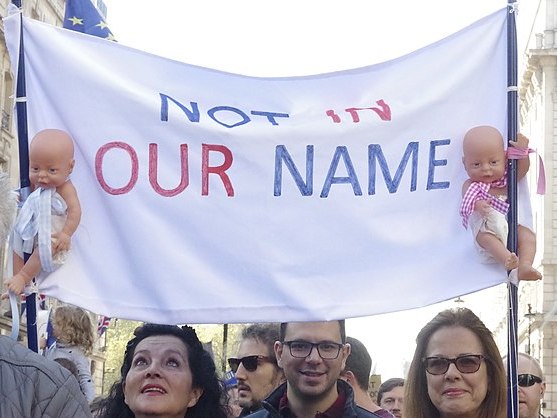
Demonstration, October 20, 2018.
|
It does not matter which option is taken, Remain or
Leave, or
indeed the different varieties that MPs are voting for with
indicative votes, in the sense that they are not solutions to the
political crisis. That was an inescapable component of the
problem with the referendum in the first place. The question
facing the polity did not pose itself as Remain versus Leave. The
truth is and has been that workers themselves have to start
dealing with the issue of resolving the crisis in their favour by
having their independent program based on their own vantage
point.
Within the circumstances of this crisis, no matter what
position MPs take on the European Union, it is not likely that
the solutions on offer will settle the matter for those with
differing opinions and indeed different interests, on Brexit.
Indeed, the experience of MPs as a whole, rather than the
government, and Executive, "taking control" of the business
program or the House of Commons suggests the opposite.
As passions are stoked up, and especially as the
frustration and
disillusion with the impasse over Brexit take hold, how the
working people work out how they can intervene in the situation
in a manner which favours them continues to be key to the
outcome. Theresa May is hopelessly stuck in irrational rhetoric
such as saying that she sides with the people against the
Legislature. While this is a definite admission that "the people"
are not in the Legislature -- that the Legislature of not "of the
people" -- it seeks to get the people to forget that the
Westminster system is anachronistic, incorrigibly dysfunctional
and in need of a fundamental rehaul so that those elected answer
to the people, not a relic from medieval times. Current
arrangements which are the product of the English Civil War
1642-1651 which created a state to combine medieval privileges, a
definition of rights based on ownership of property and of
sovereignty based on territoriality are not conducive to the
conditions today, which have surpassed those limitations. Who does
the British Parliament represent in this current civil war raging
in Britain? Why would the English, Scottish and Welsh working
class side pro or con any of the contending interests rather than
speak in their own name and elaborate their own interests?
Workers' Weekly, the newspaper of the
Revolutionary
Communist Party of Britain (Marxist-Leninist), points out the
options the people are offered. It is said that "to support
Brexit is to be xenophobic and courting economic disaster, or
that to favour Remain is to be indifferent to the interests of
the working class; while on the other hand, it is said that a
'people's Brexit' would stop the European monopolies dictating to
the British economy and exploiting cheap imported labour, while
revoking Article 50 would safeguard rights which are supposedly
guaranteed by the EU and enable people to freely travel
throughout Europe."
What the people of Britain sorely need, Workers'
Weekly
points out, is to work out their own vantage points within the
situation which will empower them to set the direction of the
economy and politics of the society. "This is the common issue
facing the whole polity and indicates what perspective to take in
providing a solution to the Brexit crisis which favours the
people. New forms are required, forms which translate the
people's voices into the determining factor," Workers' Weekly
writes.
"The reality of Britain, its ruling elite and its role
in the
world must be taken into consideration. This is the crucial
question taking precedence over whether the EU's relationship to
Britain is one of benefactor or dictator. Indeed, it can be said
that the overall neo-liberal agenda of the Westminster government
is consistent with that of the oligarchs of the EU. What must be
recognized is that British imperialism is responsible for many,
many crimes since this parasitic stage of capitalism came into
being. And before that the British colonialists built their
empire on which 'the sun never set' and enslaved and devastated
the peoples of this empire, extracting fabulous wealth from their
peoples and resources," Workers' Weekly points out.
It is clear that what is at stake is how to control and
expand
the spoils of a "Great" Britain. "In particular, the City has
been built up as the hub of financial markets the world over.
This is parasitic finance capital par excellence, and one which
Brexit or no Brexit the ruling elite jealously attempts to guard
for themselves," Workers' Weekly writes.
"[T]he fierce and ongoing dogfights in the ruling
circles also
represent the differing calculations within their ranks over the
future of NATO, for instance, over the defence and the
militarization of the economy, cloaked in declarations over the
national interest, and over which direction the economy should
take," Workers' Weekly says and adds:
"Britain owes it to the Irish people too to settle
things in
line with the aspirations and struggles of the people of Ireland.
The ruling class of England has dominated the island of Ireland
for centuries. In the midst of the inter-imperialist First World
War, the Irish heroically fought for their independence, and were
brutally slaughtered by the British. But it lit a spark, and in
the course of the Irish people attaining their independence the
British manoeuvred so as to annex six counties in the north of
Ireland. The Downing Street Declaration affirmed that the whole
people of the island of Ireland must decide their future, and the
Good Friday Agreement of 1998 represented a major political
development and a binding peace treaty involving the British and
Irish parties. It is this agreement which the DUP [Democratic
Unionist Party] is prepared to flout and Theresa May is willing
to tear up in maniacal pursuit of her Deal.
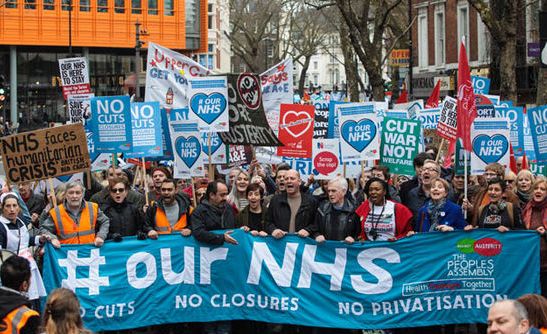
Thousands march in London in support of the NHS,
March 4, 2017
|
"A further indispensable ingredient to the solution of
the
political crisis into which the various factions of the ruling
elite have led Britain, and which the Brexit referendum has
cruelly exacerbated, is to build the unity of the people of
Scotland, Wales and England, one working class, one programme.
This requires entirely different arrangements between the three
countries, not to mention Ireland itself, on the basis that
Scotland and Wales need their own nation-building projects, while
the colonialist nation-building project in England has long since
had its day, and under the rubric of the Mother of Parliamentary
Democracy has a toxic legacy which betrays its colonialist roots
and history."
Workers' Weekly decries the attempt to set people
at
each other's throats based on the claim that justice and progress
rests with one side or another of the Brexit fiasco. And a fiasco
it is -- "a thing that is a complete failure, especially in a
ludicrous or humiliating way."
The working class in England, Scotland and Wales,
comprised of
their own nationality and peoples of all nationalities from the
world over, constitute one working class which is indeed speaking
out on its own behalf against the anti-social offensive, in
support of a pro-social program which upholds the dignity of
labour and puts human beings at the centre of all development.
"The two strands of this demand, relating to the collective of
the working class and to the rights and well-being of all
sections of the people, are part of the one whole of a Brexit
solution. The unity of the people must be safeguarded, Brexiteers
and Remainers alike. The right to conscience demands that each
has the right to push for their positions on the basis of how
they serve to resolve the crisis. Naturally, no-one should have
the right to organize on the basis of treating other human beings
as not worthy of rights. The resolution of this apparent
conundrum is to affirm that all the positions from whatever side
are well and fine, and that everyone is entitled to speak up and
organise to garner support, but this must be done within the
politics of social responsibility as opposed to the irresponsible
politicization of vested interests."
Workers' Weekly says attention should be paid to
asking
those who put forward this or that position to strive to answer
the question as to how problems facing the people are to be
provided with solutions and how the positions taken on Brexit
will contribute to that cause. The solutions must be
justifiable.
Workers' Weekly points out that within this
discussion,
it has to be recognized that the political set-up is one in which
the people are not empowered to implement or even arrive at
decisions which affect society, and that the economic set-up is
dictated by narrow private interests. Deal-making has given rise
to many proposed variants of Remain/Leave, whether it be a
Customs Union, full membership of the EU, exiting on WTO rules,
or some other proposition, many of which refer to institutions
and arrangements which are themselves racked in crisis and
irrationality.
"The goings-on in the House of Commons have not only
been
unseemly and have lowered the level of politics, but are not
directed at resolving the problems created by the results of the
Referendum so as to provide a way forward." The set-up of a
party-in-power and a party-in-opposition is not capable of
negotiating anything because of the absence of a pro-social aim.
Cabinet government and its prerogative powers are dysfunctional
and lie in tatters. Parliamentary votes have ceased to mean
anything at all whether 'meaningful,' 'indicative,' based on
motions presented to MPs through their twitter accounts or other
social media. To even try to give a rational explanation to
irrational proceedings is to become irrational oneself. To hold
up the Westminster system of rule as the paradigm of democracy
and a civilized world is to not see that the sun has already set
and preparations must be made for a new dawn.
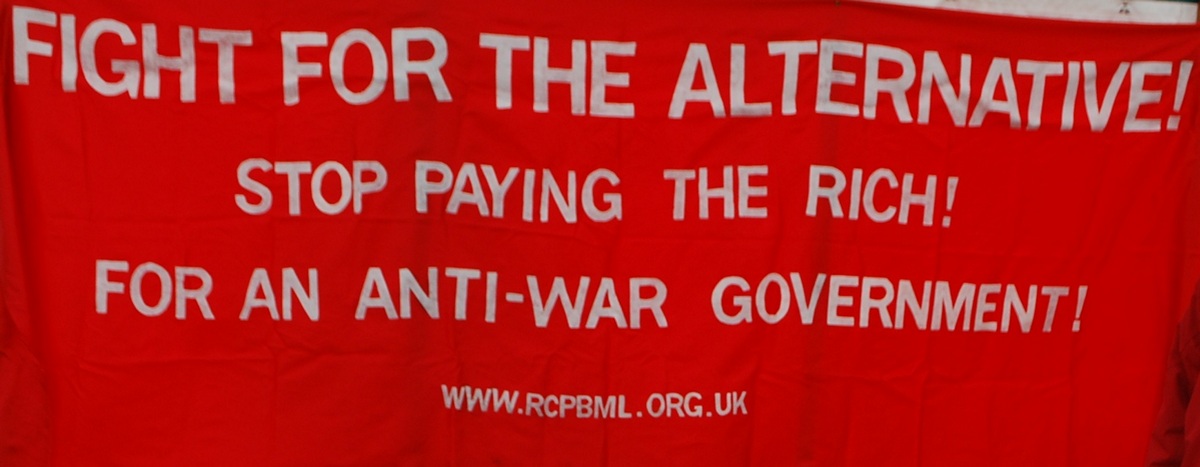 Workers' Weekly
calls for attention to be paid to the
fact that today, "the budget goes to war production, instead of
going on hospitals and social programmes, and every justification
is given to promoting austerity. Deals are struck behind closed
doors. Big business and the City rule the roost." Workers' Weekly
calls for attention to be paid to the
fact that today, "the budget goes to war production, instead of
going on hospitals and social programmes, and every justification
is given to promoting austerity. Deals are struck behind closed
doors. Big business and the City rule the roost."
Rational deliberations are required on these issues, the
newspaper points out. Instead, people "are being deprived of the
conditions to form rational and informed conclusions and unite
around them. It can be said with confidence that the issue facing
the working class and people is not the issue of Brexit or no
Brexit. It is not such a false binary issue. The issue facing
them is how to bring the wisdom of the peoples of Wales, Ireland,
Scotland and England into play."
"Whether or not Britain remains in or leaves the
European
Union, itself beset with crises and with growing disunity between
the component states and with unaccountable decision-making, and
on what date it leaves, there is a demand for turning things
around in a manner which favours the working class and people, in
a manner which settles scores with all that is being demonstrated
as so rotten with the old way of doing things. New arrangements
are required. How else can such issues as international trade on
the basis of mutual benefit, the respect for the sovereignty of
all nations, the settling of international issues through
peaceful means, the implementation of the rule of law -- how else
can they be achieved?"
"In the face of the all-round crisis, the alternative
that is
required is to empower the peoples to have a decisive say on all
those matters which affect their lives," Workers' Weekly
concludes.

Palestinian People Will Not Back Down

On Land Day, March 30, tens of thousands of Palestinian
rallied at the Israel-Gaza fence to mark the first anniversary of
the Great March of Return, weekly protest marches that began on
Land Day last year to affirm the right of return of all those
brutally displaced from their homeland by the creation of Israel
in 1948 and the ongoing occupation, and also to call for an end
to Israel's and Egypt's 12-year blockade of Gaza. The vitality of
the protests across the West Bank and Gaza show that the
Palestinians remain determined and undaunted. The protestors
faced off against Israeli tanks and troops massed on the
fortified perimeter, who attacked them with live rounds, rubber
bullets and tear gas. Three 17-year-old boys were killed and at
least 207 people were wounded, according to Gaza's health
ministry.
"We will move towards the borders even if we die," said
Yusef
Ziyada, 21. "We are not leaving. We are returning to our land."
Mohammed Ridwan, 34, told Al Jazeera the huge turnout on March 30
was "ample proof that our people will not back down until they
gain their legitimate rights." Bahaa Abu Shammal, a 26-year-old
activist, said he was at a protest site "very far away from the
separation fence," but still, nearly "suffocated due to Israeli
tear gas." He said, "We need to break the brutal siege we suffer
from. We want to return to our lands."
News reports indicate that at least 49 children have
been
killed at the protests at the Gaza border fence since the
protests began last year. According to the UN, more than 6,000
children have also been injured by live ammunition, rubber
bullets and tear gas. According to the UN's World Health
Organization (WHO), 2,980 children were so badly wounded that
they required hospital care. Thousands have sustained serious
wounds, including blindness, head injuries, and amputations.
Twenty-one children have had upper or lower limbs amputated
following injuries inflicted by Israeli troops as they
participated in weekly demonstrations, according to the WHO.
Many of those who survived have suffered life-changing
injuries and have been denied, or been unable to access, adequate
medical care to address their needs. The demand for specialist
medical support has far exceeded Gaza's health system, which has
been undermined by years of the U.S.-backed blockade. According
to the WHO, 80 per cent of children injured at the protests who
applied to leave Gaza to receive emergency medical treatment in
Israel over the last year have had their permits rejected or
delayed.
According to the UN, Israeli violence at the March of
Return
demonstrations injured more than 20,000 adults between March 30,
2018 and January 31, 2019, and many more have occurred since
then. The Palestinian Centre for Human Rights reports the deaths
of nearly 200 Palestinian protesters shot by Israeli
sharpshooters. In contrast, four Israeli soldiers are reported to
have been injured in the same period.

  


 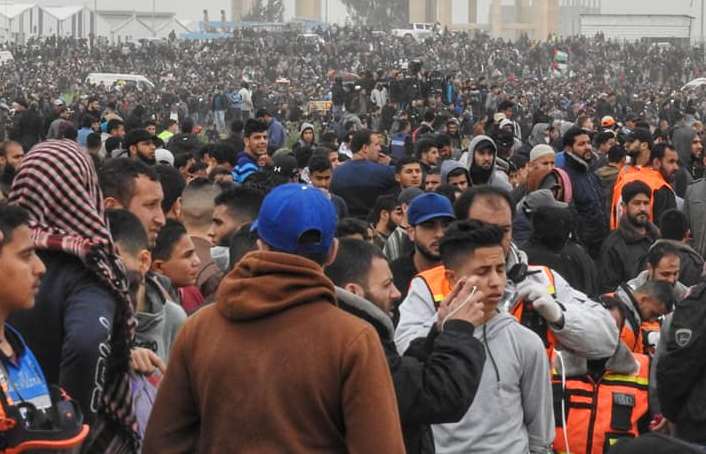

Westbank, Palestine

Canada
Toronto, Ontario

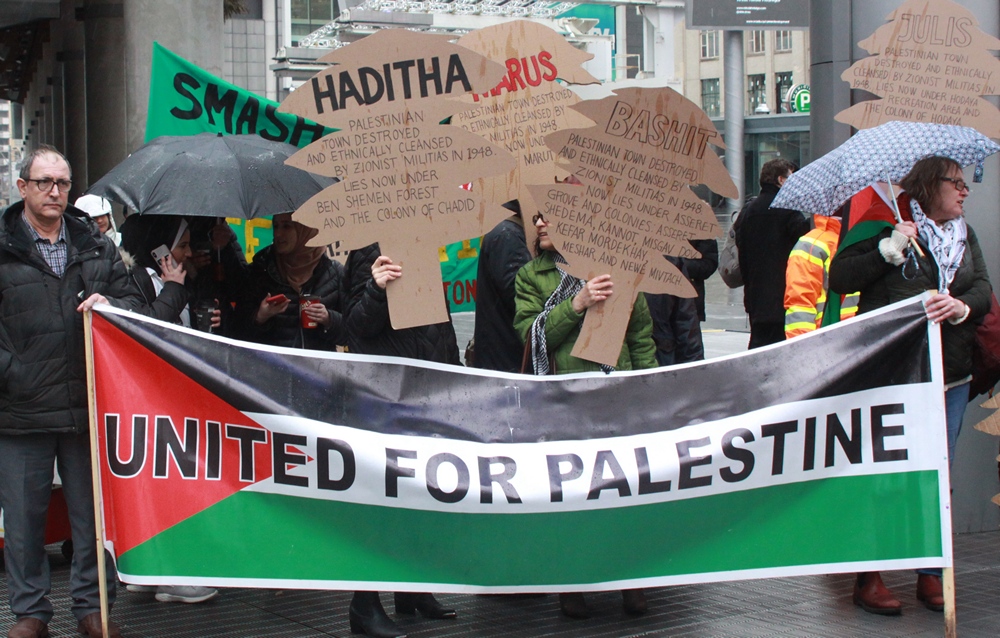 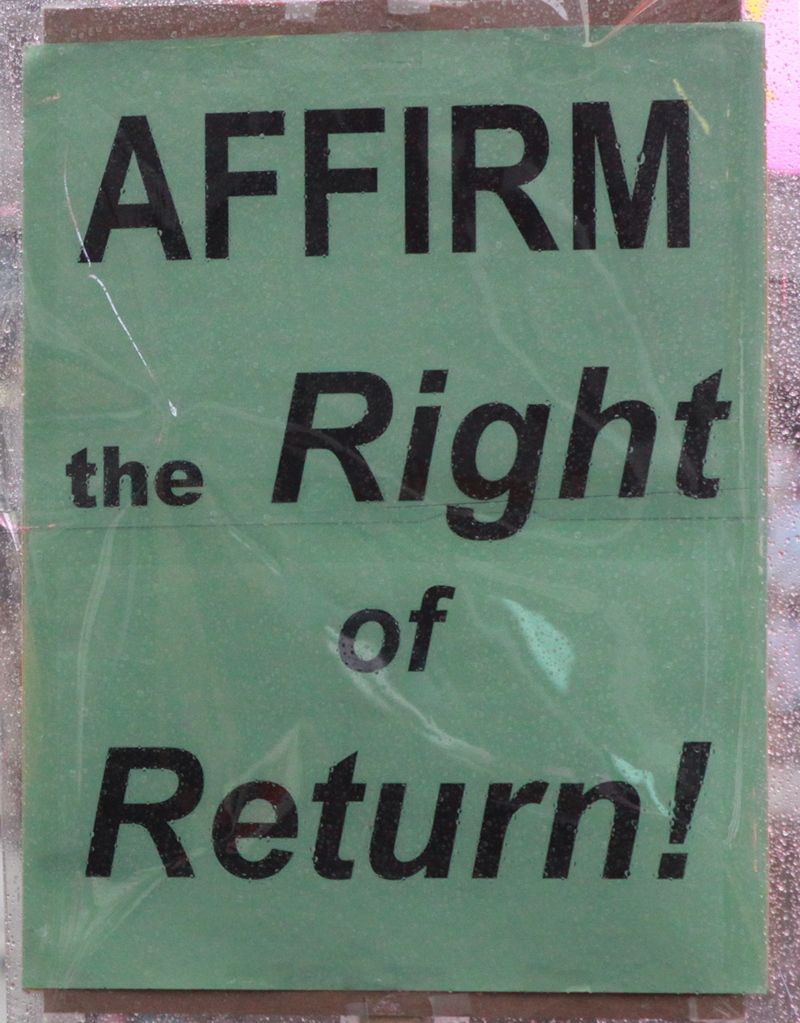
Ottawa
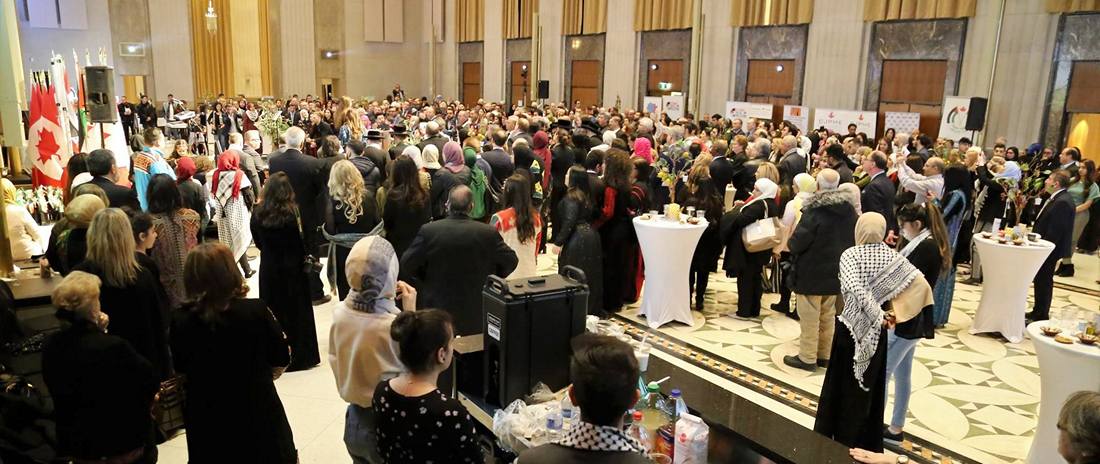

Actions Around the World
Tel Aviv, Israel

Amman, Jordan

Sydney, Australia

Iwo, Nigeria

Sudan
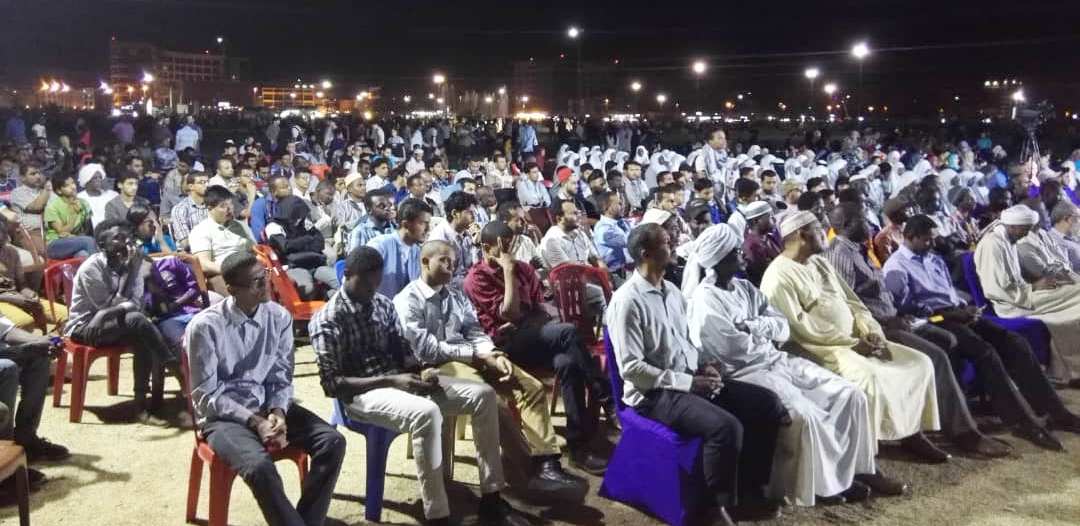
Brazil

Syracuse, USA
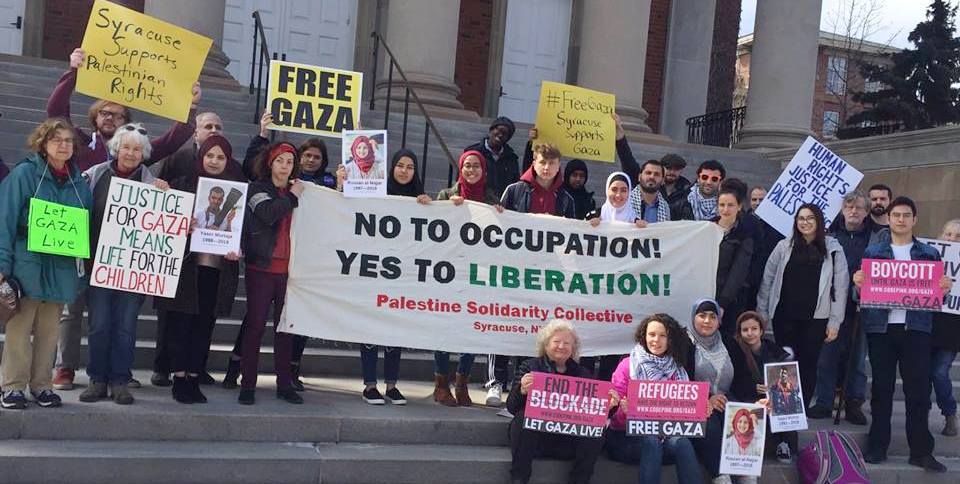
New York City, USA

Boston, USA
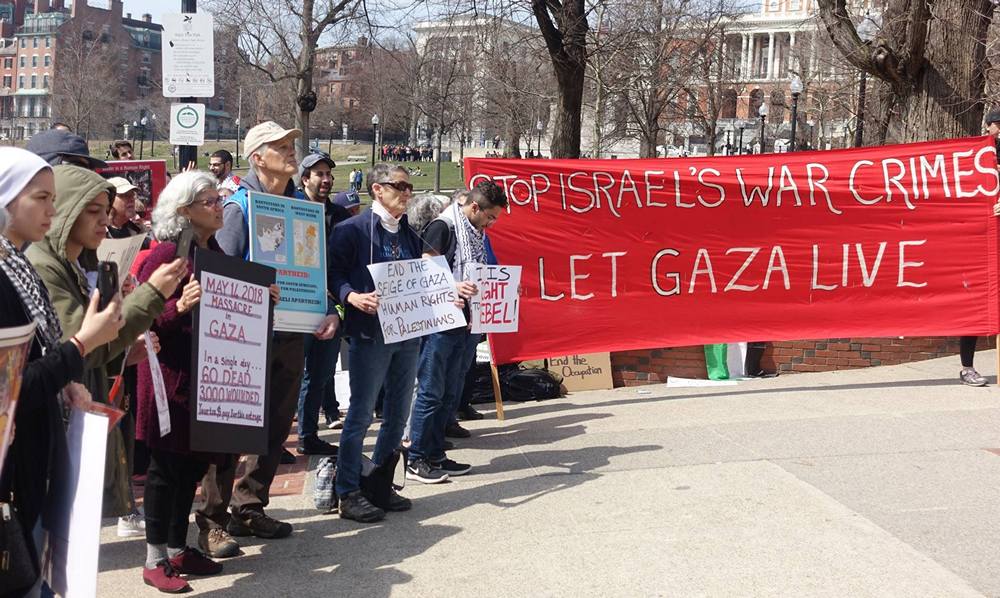 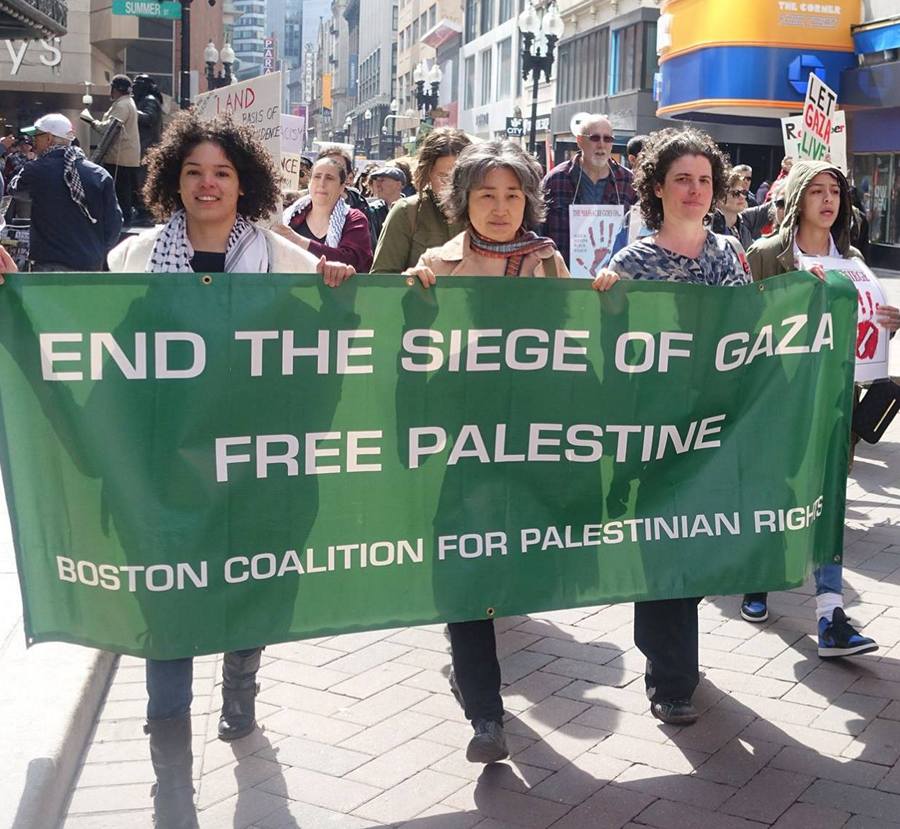
San Francisco, USA
 
Belfast, Ireland


London, England

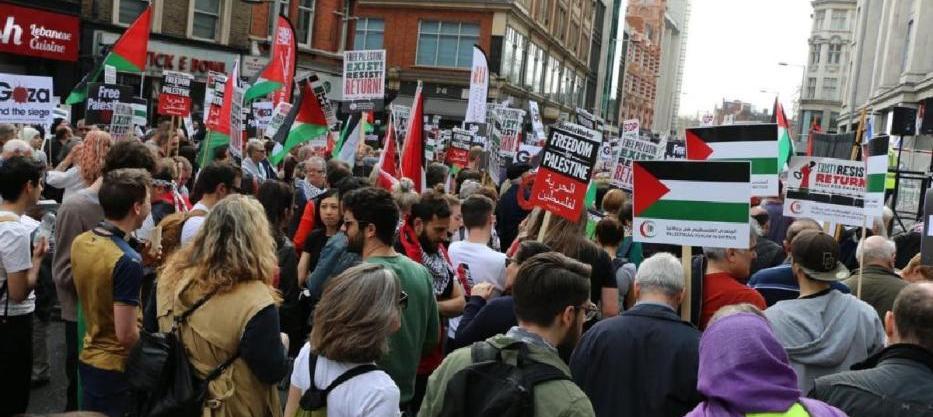
Manchester, England
 
Amsterdam, Netherlands

Hungary

Supplement
Important Anniversaries
|
|

(To access articles individually
click on
the black headline.)
PDF
PREVIOUS
ISSUES | HOME
Website: www.cpcml.ca
Email: editor@cpcml.ca
|



 Workers' Weekly
calls for attention to be paid to the
fact that today, "the budget goes to war production, instead of
going on hospitals and social programmes, and every justification
is given to promoting austerity. Deals are struck behind closed
doors. Big business and the City rule the roost."
Workers' Weekly
calls for attention to be paid to the
fact that today, "the budget goes to war production, instead of
going on hospitals and social programmes, and every justification
is given to promoting austerity. Deals are struck behind closed
doors. Big business and the City rule the roost."



























 The long-standing demand of
the working people is that those
in government must take up their social responsibility to
organize the productive forces to guarantee the right of all to
the highest quality health care and seniors' care, as well as
education and other aspects of public services which affect their
lives. Albertans reject policy objectives and electoral platforms
full of platitudes from the cartel parties, or the obscurantism
of balancing a budget through austerity where those in power
control what is being balanced or not balanced and who
benefits.
The long-standing demand of
the working people is that those
in government must take up their social responsibility to
organize the productive forces to guarantee the right of all to
the highest quality health care and seniors' care, as well as
education and other aspects of public services which affect their
lives. Albertans reject policy objectives and electoral platforms
full of platitudes from the cartel parties, or the obscurantism
of balancing a budget through austerity where those in power
control what is being balanced or not balanced and who
benefits. The cartel parties vying
for power in the Alberta election all represent to one degree or
another the neo-liberal line that the right to health care cannot be
guaranteed because of a "lack of money." The budget plans of the New
Democratic Party (NDP) and the United Conservative Party (UCP) both
reject increased investments in social programs and public services.
Instead they call for cuts to spending on social programs and public
services with only the degree marking any difference. The working
people are told that the only choice is to accept "compassionate
austerity" or be faced later with massive cuts, two-tier medicine, and
more privatization to serve the rich.
The cartel parties vying
for power in the Alberta election all represent to one degree or
another the neo-liberal line that the right to health care cannot be
guaranteed because of a "lack of money." The budget plans of the New
Democratic Party (NDP) and the United Conservative Party (UCP) both
reject increased investments in social programs and public services.
Instead they call for cuts to spending on social programs and public
services with only the degree marking any difference. The working
people are told that the only choice is to accept "compassionate
austerity" or be faced later with massive cuts, two-tier medicine, and
more privatization to serve the rich.
 At the end of the four
years of the proposed NDP and UCP
budgets, what problem will they have solved? Certainly not the
problem of guaranteeing health care and education for all as a
right. Even their budgets remain unbalanced with the NDP deficit
only slightly greater than that of the UCP and the overall
provincial debt not much different. The UCP cuts revenue by
decreasing corporate taxation while at the same time more
severely cutting expenditures for social programs and public
services. The NDP cuts expenditures on social programs and public
services as well but with not much change in revenue. The end
result for the two cartel parties in terms of their balancing act
is a saw-off, while problems in the health care and education
sectors remain unresolved.[
At the end of the four
years of the proposed NDP and UCP
budgets, what problem will they have solved? Certainly not the
problem of guaranteeing health care and education for all as a
right. Even their budgets remain unbalanced with the NDP deficit
only slightly greater than that of the UCP and the overall
provincial debt not much different. The UCP cuts revenue by
decreasing corporate taxation while at the same time more
severely cutting expenditures for social programs and public
services. The NDP cuts expenditures on social programs and public
services as well but with not much change in revenue. The end
result for the two cartel parties in terms of their balancing act
is a saw-off, while problems in the health care and education
sectors remain unresolved.[
 Teachers are going door to
door and speaking with their
neighbours about their concerns with the present conditions in
the education system. The refusal of governments to provide the
necessary investments to solve the problem of class sizes
violates the demands not only of students and teachers but of the
entire polity. Based on teachers' door-to-door experience so far, it is
clear that people are concerned about the state of
education and express a sentiment that something must be
done.
Teachers are going door to
door and speaking with their
neighbours about their concerns with the present conditions in
the education system. The refusal of governments to provide the
necessary investments to solve the problem of class sizes
violates the demands not only of students and teachers but of the
entire polity. Based on teachers' door-to-door experience so far, it is
clear that people are concerned about the state of
education and express a sentiment that something must be
done.


 For example, the Calgary
Board of Education (CBE) states that
it requires an additional $21 million in funding just to maintain
its existing level of service, even without adding more students.
The CBE also points out that government funding in all areas
falls short of what is required. It states that $136 million in
allocated funding goes to support the 21,000 students with
identified special needs, while actual government funding only
accounts for $78 million. Similarly, support targeted at the
29,000 English Language Learners in the CBE totals $31 million,
while government grants in this area total only $23.5
million.
For example, the Calgary
Board of Education (CBE) states that
it requires an additional $21 million in funding just to maintain
its existing level of service, even without adding more students.
The CBE also points out that government funding in all areas
falls short of what is required. It states that $136 million in
allocated funding goes to support the 21,000 students with
identified special needs, while actual government funding only
accounts for $78 million. Similarly, support targeted at the
29,000 English Language Learners in the CBE totals $31 million,
while government grants in this area total only $23.5
million.
 Striking teachers rally outside
the Alberta Legislature, Edmonton, February 7, 2002.
Striking teachers rally outside
the Alberta Legislature, Edmonton, February 7, 2002. The final report of
Alberta's Commission on Learning (ACOL)
was released on October 7, 2003. The report, Every Child
Learns, Every Child Succeeds, listed 95 recommendations for
achieving the commission's vision for education and identified
the increased investment needed at $600 million. It established
province-wide guidelines for average class sizes across each school
jurisdiction, but no recommendation that would require school
boards to meet those sizes.
The final report of
Alberta's Commission on Learning (ACOL)
was released on October 7, 2003. The report, Every Child
Learns, Every Child Succeeds, listed 95 recommendations for
achieving the commission's vision for education and identified
the increased investment needed at $600 million. It established
province-wide guidelines for average class sizes across each school
jurisdiction, but no recommendation that would require school
boards to meet those sizes.

 The Alberta Union of
Provincial Employees issued a press release on March 27, responding to
the NDP government's announcement that it would create 2,000 long-term
care beds throughout the province if elected.
The Alberta Union of
Provincial Employees issued a press release on March 27, responding to
the NDP government's announcement that it would create 2,000 long-term
care beds throughout the province if elected. Facts show that far from
"saving money" Kenney is
proposing to
seize more of the social wealth to line the pockets of the rich.
Under the deal made with the private company Sonic in 2015, Sonic
would finance the land and building for a new lab. They would be
repaid the fixed investment of social wealth with interest and
guaranteed a profit from operating the enterprise. Alberta Health
Services would have to buy the facility and equipment if the
contract was not renewed after 15 years, even though Sonic would
have already been repaid its invested social wealth with
interest, not to speak of the operating profit, which is lost to
the public.
Facts show that far from
"saving money" Kenney is
proposing to
seize more of the social wealth to line the pockets of the rich.
Under the deal made with the private company Sonic in 2015, Sonic
would finance the land and building for a new lab. They would be
repaid the fixed investment of social wealth with interest and
guaranteed a profit from operating the enterprise. Alberta Health
Services would have to buy the facility and equipment if the
contract was not renewed after 15 years, even though Sonic would
have already been repaid its invested social wealth with
interest, not to speak of the operating profit, which is lost to
the public. "Albertans value public
services, and they need to be
strengthened, not cut" said Joel French, PIA Executive Director.
"Our seniors deserve a robust public system that provides high
quality care. Some politicians are promising tax cuts to large
corporations and the wealthy, but our government should be
focussed on investing in proper care for Alberta's seniors who
have worked hard their entire lives to contribute to our
province."
"Albertans value public
services, and they need to be
strengthened, not cut" said Joel French, PIA Executive Director.
"Our seniors deserve a robust public system that provides high
quality care. Some politicians are promising tax cuts to large
corporations and the wealthy, but our government should be
focussed on investing in proper care for Alberta's seniors who
have worked hard their entire lives to contribute to our
province."
 The energy regulator has
made the well-worn claim that it is
balancing the economy and the environment. In fact neither the
problems of the economy or the need to defend Mother Earth are
being addressed.
The energy regulator has
made the well-worn claim that it is
balancing the economy and the environment. In fact neither the
problems of the economy or the need to defend Mother Earth are
being addressed.


























 Pence then took the floor
in the style of a self-appointed prosecutor, calling Venezuela a failed
state and its government "illegitimate," making sure to include that
Venezuela represented "a threat to the peace and security of the
region," emphasizing that it was time for the UN to "act" -- a
dishonest attempt to make the case for an eventual military
intervention like the U.S. has been threatening, and which Pence made
sure to say was still "on the table." He announced that the United
States was drafting a resolution calling for the UN credentials of the
Bolivarian government to be revoked and assigned instead to the coup
forces it sponsors, and called on all states to support it, presumably
at a future meeting of the General Assembly even though not even a
third of its members have recognized its puppet Juan Guaidó as
Venezuela's president.
Pence then took the floor
in the style of a self-appointed prosecutor, calling Venezuela a failed
state and its government "illegitimate," making sure to include that
Venezuela represented "a threat to the peace and security of the
region," emphasizing that it was time for the UN to "act" -- a
dishonest attempt to make the case for an eventual military
intervention like the U.S. has been threatening, and which Pence made
sure to say was still "on the table." He announced that the United
States was drafting a resolution calling for the UN credentials of the
Bolivarian government to be revoked and assigned instead to the coup
forces it sponsors, and called on all states to support it, presumably
at a future meeting of the General Assembly even though not even a
third of its members have recognized its puppet Juan Guaidó as
Venezuela's president.











